#and while she succeeded with unity and destiny
Explore tagged Tumblr posts
Text
A/N: Hello again, and with this I think (?) I may have succeeded in writing enough bionicle fic to get it out of my system (unless another plot bunny hits me like a cannonball, but... eh, we'll see) and thus, here is the companion piece to the Vakama & Roodaka oneshot.
This time, exploring the scene where Vakama entered the Great Temple, from his side of things! This was also partially inspired by the scene in Challenge of the Hordika where Nokama is almost physically repulsed in trying to enter the Great Temple :)
x
In the tunnels beneath the temple, Vakama must stoop.
At first he shuffles, mutated arm tucked against him and his sole hand brushing only briefly along the floor to steady himself, but the passages are dark and deep and lined with creatures which seek out the weak. The eyes that watch him are not hungry. They keep their bellies too full for that.
In the end, it is easier quicker to drop to all fours, to share the weight between claw and tool that feet alone cannot. His altered form folds into the new stance with frightening familiarity. It's comfortable.
Natural.
The crown of his mask grazes the tunnel's ceiling, but only in passing. His gait is sure. Well. Surer than the ungainly slouch it had been before.
It was said – back when Matoran were awake to say such things – that even the strongest swimmers of Ga-Metru would hesitate before plunging into the depths of the protodermis sea. Not because the creatures there had any fondness for the taste of Matoran. In truth, it was thought that the rahi actively disliked the flavour. No, it was because the way Matoran swam was indistinguishable from the rahi's usual prey. Only when they had sunk tooth and jaw into their meal would they realise their mistake.
It was an annoying, if harmless mistake for the rahi.
Matoran couldn't say the same.
Vakama's early crawl through the passage had been like that of a Matoran swimmer: functional, but slow and indiscernible from wounded prey. Creatures drag themselves down into these depths to die, in hopes that they will be devoured only when they are too far gone to feel it. The eyes are patient. They will wait to see if this newcomer is similarly inclined.
And so when Vakama drops to his haunches, the eyes blink. Reassess. He moves less like the hunted and more like the hunter now, more predator than prey, and the eyes – and teeth – keep their distance after that.
The path Vakama stalks through was once a protodermis pipe, made obsolete even before the cataclysm. Newer conduits had been built, more efficient, more resilient, and this one had been disconnected but never dismantled. When he reaches its origin, it takes some effort – and his blazer claw – to break the seal across the hatchway, but when he does, one of the temple's protodermis purification chambers looms above him.
The room beyond is quiet.
Unmarked.
He doesn't realise he's stopped until the chittering of his audience draws closer. The snarl he throws back echoes off the pipe's walls, and the eyes retreat, but do not leave.
Vakama curls his hand around the lip of the hatch, and then falters.
Something is wrong.
It's not a pain, because the feeling does not hurt as it ought, but something is undeniably, fundamentally wrong. It causes his breath to catch, his hand to flinch, and it would be so easy, so easy, to turn and walk away, only...
Only he came here for a reason.
The wrongness flares, amplified for a moment, and then he pulls himself up. The eyes watch, but do not follow. Do they feel it too? Can even such base creatures sense the innate malice the temple exudes?
He clambers out of the purification chamber – empty and abandoned now – and stumbles upon his landing. He catches himself, but does not rise back to his feet.
Wrong.
This is wrong.
And at the edge of the wrongness there is a strange sort of terror. It dreads the same way the fire fears the sea, the same way the prey fears the predator; it is the meeting of two primally antithetical forces where only one can survive. It whispers turn back through his mind.
He moves into the next room.
It's one he knows well. Light filters down from the rot-stained windows, centering – as it had the day he'd first seen it – on the suva, and casting long sentinel shadows of the columns standing to attention around it. A crack mars the suva, its stone dome now split cleanly in two from the quakes, and – drawn by some desire he cannot identify (instinct, curiosity... nostalgia?) – he approaches.
It seems so small now. Even bowed and altered in his Hordika form, he looms over the Ta-Metru symbol he'd once had to stretch to reach.
Unbidden, his hand moves to the niche where once he'd placed a Toa Stone – where once he had though himself chosen, duty-bound, destiny-gifted – and falters a breath from the stone.
The wrongness spikes.
Screams.
And with a twist of something he will not call horror, he understands it is not originating from himself.
But from the temple.
It is repulsion. It's alienation. It's recognising him, but as other, as rahi.
It's disgust that a monster would dare enter its sanctuary.
In the Ta-Metru carving, stone once polished to the point of fragmented reflection, he sees a glimmer of his own face. Neither Toa nor Matoran. Nothing blessed by Mata Nui.
Vakama recoils.
And then a wave of his own disgust, propelled by that fury that runs so close to the surface now, rolls through him. If you didn't want us as the Toa, you should've stopped Makuta from choosing us, he thinks, and digs his claws into the stonework.
The wrongness sings.
But he knows it for what it is now, and his morphed, clawed hand gorges scars through the carving. The stone is soft. Its makers had never imagined someone would take a blade to it.
There comes a tapping from across the room, echoing brazenly off the ancient stone walls, and Vakama retreats instinctively into the shadows. A Rahaga enters.
Norik?
No, this Rahaga's armour is more akin to a Po-Matoran than a Ta-Matoran's, the colour of dust and stone. Vakama tries to recall the Rahaga's name – and then dismisses the attempt.
It won't matter, in the end.
The Rahaga walks as he always has, stooped and slow, but clearly unhindered by the temple. He passes by the suva and runs one gnarled hand across the stonework, his movements marred by curiosity rather than reverence.
The rage arrives a fully-formed creation. It drowns out the wrongness, floods the apprehension, and he is moving before he's decided that this is the path he wants.
It is not pain, for it does not hurt as it ought.
But it does still hurt.
x
Whatever the Rahaga might once have been, they are old and weak now. Four are captured before Vakama's rage has a chance to cool, but the ire is no less dangerous when it does.
(That's the thing about Ta-Metru; it's not a place of fire so much as it is of magma. And magma doesn't extinguish with the cold; it sets. It moors itself into place, an unmovable, burning force.)
The rage settles, solidifies around his heart and lungs and carves a home between his breaths.
(Magma is not fire. It does not leap blindly from one source to the next. Instead it advances. Slowly. Steadily. It finds a channel, a destination, and it engulfs all in its path until it reaches it.)
He finds the last two remaining Rahaga, pathetically ignorant to their brothers' fates and still scavenging the temple for answers. He hears the way Norik appraises his sister's translation, relief clear in his voice that they are one step further on this wild rahi chase. Relief, surely, that the Rahaga are one step closer to regaining their Toa form.
(And Vakama's anger has found its destination.)
He does not descend on the Rahaga's leader the way he has the others. No. Norik will know what's coming for him first. He gets to fear. Vakama waits until Gaaki has gone, until Norik is alone, and then he circles. The wrongness thrums in his veins, weighing him down and labouring his breaths. It doesn't matter. Let Norik hear his approach.
Norik doesn't try to run. Vakama will give him that much. (A wise choice. Vakama intends for this encounter to last, but if Norik runs, Vakama cannot be sure he won't chase.) Instead, the malformed once-Toa calls out and actually tries to approach him. Stupid. Doesn't he know that he won't win any fight, transformed as he is? As both of them are? No, instead, he tries to talk. As if they are equals, as if Norik has done anything to deserve his respect rather than his scorn. As if he has earned the temple's forgiveness for his trespassing.
Even when Vakama raises the fate of Norik's fellow Rahaga, Norik attempts to sway him with the illusion of reason, talking of duty and unity, as if he's not using the other Toa Hordika to chase after a rahi myth for his own desires. As if their roles are in any way comparable, both Toa of Fire once, both leaders, it's true, but Vakama hasn't forgone his duty to chase after selfish needs.
And it stops now.
Vakama circles closer, and Norik is still talking, unease in his voice, but not fear. Still searching for the right words to turn Vakama to his bidding as he has the other Toa Hordika. Ever the voice of two-faced logic.
Why won't he just shut up?
Does Norik think him to be as gullible as the others? As quick to desert his duty as them?
And Vakama knows he wants – needs – to shake that assurance, that arrogance out of Norik. Needs to see that facade of self-righteous wisdom crumble into the terror of his situation.
The growl begins deep in his chest and, unleashed, it becomes a roar. He rears out of the darkness, into the weak sphere of light surrounding Norik – and there, there he finally sees true fear fill the old fool's eyes.
Something slams into Vakama and he reels, his roar cut short. His hand reaches automatically, defensively, to his mask. He finds only water there. It clings to him, imbued with some sort of power – he can feel something other in it – but otherwise impotent.
"Leave my brother alone," Gaaki snarls. She stands in the doorway, small and hopelessly overpowered, but her shoulders are tensed with a stubborness Vakama recognises. Already, her spinner is powering up for another shot.
Well. Two can play at that game.
Vakama's rhotuka fires into motion, but the water has seeped into the mechanism, and dowses the fire before it has a chance to catch. He gives it a withering look, before turning the expression onto Gaaki. "Very clever."
Another water spinner hits him, but this time he is braced for it and all it does is wash harmlessly off him.
"Is that all you have?" he asks. His blazer claw splutters, but the claws on his hand flex. After all, there's more than one way to defang a muaka...
Gaaki steps back. Good. She knows she's outmatched. "It's a devastating attack underwater," she offers, and her words are strong but there is a cracked edge to them.
"Then you'd better start finding a puddle," Vakama growls, "before my claws find you," and he drops into a run, feet pounding and fangs bared and that ever-present wrongness humming about him.
She doesn't flee. Just like Norik, she stands her ground, gnarled fingers wrapped tight around her staff. Her eyes are hard, but he sees the way her hands shake.
How long will her resolve last, Vakama wonders. Before or after the claws find their mark?
He never finds out.
He's knocked off his feet before he reaches her, and when he hits the ground, ropes of energy pin him to the earth, like a water-bound rahi caught in a net.
What–
Norik.
He'd forgotten Norik.
He thrashes against the restraints, but they hold strong – for now. His blazer claw splutters again, but it does nothing to the energy that binds him.
He stills as he hears footsteps approach.
The two Rahaga hobble into his line of sight. Gaaki is breathing hard, as if only now is she allowing herself to feel the fear. "You left that late, Norik," she says, and even the breath that follows sounds more like a shaken wheeze than a nervous laugh. "Almost too late."
"I only had the one shot. I couldn't afford to miss," Norik replies. "He's got our brothers. Gaaki, go find–"
"I'm not leaving you alone with him," she retorts. "I only went for a moment before, and look what would have happened if I hadn't returned."
Vakama tilts his head as well as the energy net will allow. He grins at the Rahaga, anger curdling it into a sneer. "Yes, Gaaki, you're very good bait, congratulations." He shifts his gaze to Norik. "But you've always been so good at getting others to do your dirty work, haven't you, Norik?"
Norik doesn't even have the decency of guilt. Instead, he simply looks tired. "Whatever you think you know–"
"I know the truth! You don't care about the Matoran, you only care about yourselves!" He strains against the ropes, and although they do not break, there's a little more give in them than before. He slumps back to the ground, breathing hard. "You might have the other Toa fooled. You might even have the temple fooled, but not me," he growls, and the temple's hatred presses down on him, straining his last words.
Gaaki places a frail hand on her brother's arm. "Norik," she says, and there is such unbearable sorrow in her voice. "He looks in pain."
"It's not my doing," Norik assures her softly. "My snare spinner only binds."
Vakama snarls. "I don't need pity from the likes of you. I know what you are."
"We're allies, Vakama," Norik says, in that insufferably reasonable way of his. "Friends."
"You're frauds," Vakama snaps. He twists against his restraints. They slacken, just a touch. "Liars. You don't deserve to walk these floors."
And the Rahaga stand there, unburdened by the temple's hate, strangers to this land, to Metru Nui, and yet it is Vakama the temple repulses? After everything he has forgone, the life he's abandoned, the friendships he's lost, Mata Nui punishes him?
His rhotuka fires off a fire spinner, and it goes wide, cracks a wall. Norik and Gaaki stumble back, Norik preparing another snare shot, but the energy net holding Vakama snaps. Vakama lurches forward, suddenly free, and slams into Norik.
The snare spinner wraps itself around a column. It lights up the room with crackling energy.
A blast of water grazes past his shoulder, too shy of hitting Norik to commit to taking the easy shot, and Vakama reels towards Gaaki. He fires with a snarl, but hears the snare spinner coming again and ducks at the last moment.
Again his own attack misses and the shot cleaves clean through a wall. Something on the other side begins to smoulder.
Then it begins to rumble.
It's a low sound at first, as deep as the earth and just as vast. Almost like a distant growl. But then the cracks begin to spiral out across the roof, along the columns, and the room buckles.
The light flickers. The frames of the high windows above collapse.
The world becomes fragmented, filled with flickering images. Falling masonry and toppling pillars and dust – but the sounds never relent. Even in the depths of the passing darkness, the thunder continues.
And when the dust settles, so does an awful silence.
Vakama straightens, or does his best approximation of it. Fragments of cracked protodermis fall from his shoulders, his head, his back. He withdraws the hand which has somehow found itself raised above Gaaki, knocking aside the stone slab caught against his arm.
Where's Norik?
Both Hordika and Rahaga stand side by side, that quietness disturbed only by the skittering of stone shards settling. There is wrongness in his breath, his head, and it's impossible to separate where the temple's ends and his begins. But any moment now, Norik will reappear from the wreckage, bearing that ever-same holier-than-thou look, and the anger will rise anew in Vakama.
Any.
Moment.
Now.
"You've killed him," Gaaki says, and her voice breaks that terrible stillness. She draws in a half-breath that cracks into a sob. "You've... oh, Norik..."
No.
No, it was an accident. He hadn't meant to– Norik had simply been in the wrong place. It wasn't as if he'd taken a blazer claw to Norik, or hit him directly with a fire spinner. He'd only meant to... what? What had he only meant to do?
Something swings towards him and he grabs the staff before he even registers what it is.
"He's not dead," Vakama says, and maybe if he says it, he might even believe it. He snaps his gaze to Gaaki, as if her grief is bringing it to pass. "He's not. He's not as easy to kill as that. When the others– when the Toa find him, he'll be fine. Fools like him always find a way to survive."
Gaaki attempts to pull her staff free, but her strength is no match for Vakama's. He wretches it out of her grasp and tosses it aside.
"Stop that."
She doesn't listen to him, only steps back and charges up her rhotuka. The grief in her eyes fogs into hatred.
The water spinner hits him but does little more than rock him.
"Stop."
Gaaki screams, a sound of rage and anguish, and releases a volley of spinners as ineffectual as the first.
Vakama's patience – or whatever had held him in place until now – snaps. He lunges forward. His claws close around the joints of Gaaki's rhotuka and pins the mechanisms harmlessly into place, in the same manner one might pick up a baby ussal crab by the widest edge of its shell. She thrashes, but Vakama's grip holds.
"I said, stop," he snarls.
She's breathing hard, her gasps sharp-edged with agony. "You killed him," she says, voice hoarse and hateful.
His insides twist, and – Gaaki hauled by his side – he starts the ascent to where the rest of the Rahaga are trapped. He doesn't look back to the rubble. Doesn't glance for one last glimpse of Norik's resting place.
He's not dead. He's not dead he's not dead he's not
The wrongness, the hatred, has woven so deep into him, it's almost a part of him now.
Toa don't kill. Vakama can't remember who taught him that (he recalls, briefly, the flash of a gold mask, but it comes with pain – grief – and he pushes it aside before it can take root) but it gnaws at him like a trapped stone rat. Toa don't kill.
But he was never meant to be one.
And if the Great Temple – if Mata Nui – thinks a mistake was made in Vakama's destiny....
Well. That's somebody else's problem.
x
The Hordika that returns to Roodaka is different from the one she sent out. There's something new in his eyes... or perhaps something lost.
"How was the temple, Vakama?" she asks when it's just the two of them.
He looks to her. Beneath the anger, beneath the rahi, there's almost a haunted look to those eyes. It vanishes a moment later, but Roodaka never doubts her own eyes.
"Unwelcoming," he replies, and Roodaka smiles. She could have suggested Vakama pick the Rahaga off one by one in the chaos of Metru Nui, outside where her Visorak could have been an aid... but the temple had been too good an opportunity to miss.
"Good." She sets a hand on his shoulder. "You owe no loyalty to Mata Nui, Vakama. Not anymore."
He rolls his shoulder, but not sharp enough to dislodge Roodaka's hand.
"One thing I do not understand," she says. "What happened to the sixth Rahaga?"
The Toa growls. It is a gutteral sound, rooted deep in the chest and at home in a way it wasn't before. "You wanted a message left for the other Toa. I needed a messenger."
"Alive?"
Vakama shrugs his shoulder again, and this time she lets him roll her hand loose. "Does it matter, so long as they understand?" he growls.
No, Roodaka concedes as she surveys the remains of the Toa before her. She supposes not.
#bionicle#cat writes#lego bionicle#do i have a weakness for the hordika arc? you'll never know#(yes. look i was a well behaved 12year old kid who loved plots about characters going feral. i ate the hordika plotline up)#(and two decades later or there abouts i still have nostalgic fondness for it)#heya so how do we feel about vakama returning to the temple and finding it is repulsed by him?#a discovery that might not only confirm he wasnt chosen by mata nui but has been forsaken#and yeah this was the fic i technically titled 'damned'#but also casually thought of it as 'god called to let you know he hates you personally'#because that's definitely a normal thing to name a fic#also yes i like the idea that roodaka pushed vakama to enter the temple knowing he would feel abandoned by mata nui#and thus helps sever the 'destiny' part of the three virtues#i like the idea that just like matau had to invoke the three virtues to get vakama back#roodaka worked on severing vakamas ties to the three virtues to get him to turn his back on the others#and while she succeeded with unity and destiny#duty she could only derail or corrupt rather than sever entirely#and that (esp since duty is vakamas whole shtick) is why matau reminding him of his duty finally worked#i'll probably add this and the stasis tube au to ao3 in time#but for now it goes here
20 notes
·
View notes
Text
Bella’s Selfish Investment in Jacob and Renesmee’s Relationship
In Twilight, Bella Swan’s acceptance of Jacob Black imprinting on her newborn daughter, Renesmee, is often presented as a result of her trust in Jacob and her belief in the supernatural mechanics of imprinting. However, a deeper analysis of her motivations reveals a more self-serving reason: Bella gets to have everything she wants without making any sacrifices. She chooses Edward and the immortal life of a vampire while still keeping Jacob, her "best friend," tethered to her life and family. Her willingness to embrace the imprinting bond is less about what is best for Renesmee and more about preserving her own perfect reality.
Jacob as Bella’s Emotional Security Blanket
Throughout the series, Bella struggles with the choice between Edward and Jacob. While her romantic love for Edward ultimately wins, she still harbors a deep emotional attachment to Jacob. When she chooses Edward, she knows it causes Jacob immense pain, which in turn makes her feel guilty. Jacob imprinting on Renesmee provides her with an instant resolution to this dilemma—he is now bound to her family forever, but in a way that removes the romantic conflict. This means Bella can keep Jacob close without feeling guilty for breaking his heart. She never truly has to let him go, making imprinting an incredibly convenient solution for her emotional struggle.
The Illusion of a “Perfect Family”
Bella has always wanted Jacob to be a part of her family, and imprinting makes this a reality. She directly admits to wanting Jacob in her life permanently, even imagining a scenario in which he was her cousin or brother. When Jacob imprints on Renesmee, it cements his role in her life in a way that does not threaten her relationship with Edward. For Bella, this is the best of both worlds: she gets her soulmate, and she also gets to keep her best friend as part of her new vampire existence.
This arrangement creates an illusion of a perfect family dynamic, where past heartbreaks and conflicts are erased. However, this vision depends entirely on Renesmee reciprocating Jacob’s imprint-induced feelings when she comes of age. If she were to reject Jacob, it would disrupt Bella’s carefully maintained fantasy of unity and harmony.
Why Renesmee’s Rejection of Jacob Would Shatter Bella’s Illusion
If Renesmee were to reject Jacob, Bella would be forced to confront the uncomfortable truth that imprinting does not guarantee happiness. This would mean that Jacob’s lifelong devotion was not a perfect solution after all, and it would also bring back Bella’s unresolved guilt about the pain she caused him. If Renesmee does not fulfill her supposed destiny by loving Jacob in return, Bella’s carefully maintained illusion of a happy, conflict-free family would crumble.
Additionally, Bella’s acceptance of imprinting hinges on the idea that it is an inescapable fate. If Renesmee were to exercise agency and refuse the bond, it would challenge the very foundation of Bella’s justification for Jacob’s role in her life. She would have to admit that she enabled a potentially harmful dynamic rather than a predestined romance, which would make her complicit in Jacob’s suffering rather than a passive bystander.
Bella’s Subconscious Investment in Jacob’s Happiness
At her core, Bella wants to feel absolved of the guilt she carries over choosing Edward and rejecting Jacob. If Renesmee accepts Jacob as her partner, it means that Bella’s decision did not ultimately hurt Jacob in the long run—it would mean that everything worked out "as it was supposed to." Her investment in their relationship succeeding is not purely about what is best for her daughter but about what makes her feel better about herself.
By securing Jacob within her family, she removes any lingering sense of regret, allowing herself to believe that she never truly lost him—he just took on a different role. This subconscious investment is what makes it crucial for her that Renesmee and Jacob end up together. If they do not, it disrupts the narrative she has built for herself, one in which no one really loses, and all choices lead to a happy ending.
Conclusion
Bella’s acceptance of Jacob imprinting on Renesmee is not just about trusting the supernatural process—it is about securing her own ideal reality. By ensuring Jacob remains in her life without romantic complications, she gets to have it all: her eternal love with Edward and the continued presence of her best friend. However, this vision depends entirely on Renesmee conforming to expectations. If she were to reject Jacob, Bella would have to face the fact that imprinting does not erase past pain and that her perfect family was built on a fragile foundation. Her support for their relationship is, at its core, a means of self-preservation—allowing her to avoid confronting her guilt while maintaining the illusion that no one ever truly got hurt.
24 notes
·
View notes
Text
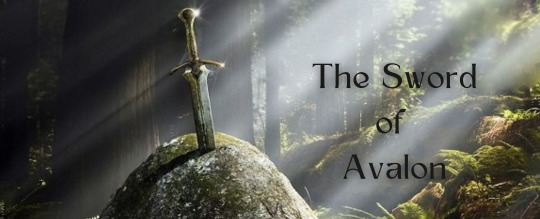
The Sword of Avalon is an interactive novel based within the world of Arthurian Legends. With a three-person team writing it.
Genre(s): Fantasy, Angst, Adventure, Action, Romance, and Hurt/Comfort.
Warning(s): This game is rated 18+ for depictions of violence, blood, death, sexual themes, profanity, alcohol consumption, mentions of torture, and war.
Scenario and NSFW (within reason) asks are welcomed.
DEMO (TBA) || FAQ

Only the true King of England may pull the sword from the stone...
It was a legend that had flooded Camelot with hopeful individuals seeking to see if they were the destined heir, from the most gallant of knights to the poorest of beggars. None of them succeeded-- no one believing the sword could be pulled-- until a boy accomplished what no other could. Not only becoming the King of England but the ruler that promised unity after a world filled with strife.
Never knowing that over a decade later he’d come face-to-face with the physical embodiment of the sword that was forever by his side; a being that has come in a time when Camelot needs them the most.
For if they lost there wouldn’t be anything left to live for.
Play as the corporeal embodiment of the legendary sword Excalibur. Wherein you’re sent from Avalon to the wondrous world of Camelot to help defeat a coming darkness that threatens to swallow the world. Will you find love along the way? And even a family?

Customizable MC: name, gender, sexuality, appearance, and a smattering of other things.
Meet a variety of people that will show you what it’s like to have a family. Along with the castle hounds that may have a greater impact than you originally thought.
Romance 1 of 5 ROs; from King Arthur himself to a hot-headed, but loyal, Knight of the Round Table. (3 ROs are gender-selectable, 1 is male, and 1 is female.) Possibility of Poly Routes (don’t know yet).
Discover all the wonders of Camelot as you get to learn about the people living within it.
Dream about Avalon and have visions about the coming darkness.
Will you be able to save Camelot and, by extension, Avalon? Or will it all fall?

Arthur Pendragon [M] - The King
29 [6′5″ || Azure Blue Eyes || Golden Hair]
The King of Camelot-- and the wielder of Excalibur-- Arthur is a kind-hearted man who wouldn’t hesitate in defending anyone he believes needs it. While some may call him naive, and too pure of heart to sit on the throne, Arthur has proven himself time and time again with his ability in leading. Will you be the thing that he’s been missing all this time? Is the connection you feel with him something more than him just wielding Excalibur?
“I don’t know how this is possible, but I do know that I never want to let you go. I’ve waited my entire life for you. I-I think pulling Excalibur from the stone was in my destiny all along. Not to become the King of England, but to meet you.”
Vivien Lunete [F] - The Servant
27 [5′5″ || Slate Gray Eyes || Dark Brown Hair]
One of the first people that you meet upon entrance of Camelot. Soft spoken, with a surprisingly insightful look on life, she makes an impression on you automatically; not to mention the feeling that you’ve met her somewhere before. You don’t know what will happen in the coming days, but you hope that you’ll be able to get to know her more.
“You are more precious to me than any stone, my beloved, I would gladly lay upon a pyre and light it on fire if it meant keeping you safe. There is nothing that I wouldn’t do to keep you.”
Morgan/Morgana Le Fay [M/F] - The Sorcerer
28 [6′3″ || Emerald Green Eyes || Raven Black Hair]
The half-sibling of King Arthur that tends to stick to the shadows of the castle. Their sarcastic tone only softening slightly when dealing with their brother but for everyone else it’s mainly thinly veiled exasperation. Will you be able to get past the icy exterior of their heart? Seeing what no one else, but Arthur, has ever seen before?
“I’ve been called many things in my life, darling, but I think the sweetest is being able to be called yours. Just as I’m able to call you mine. Wherever our paths may lead us in the future, I’m sated with the knowledge that they’re intersected at least once.”
Emrys/Emrya Wyllt [M/F] - The Court Wizard
(Looks) 33 [5′8″ || Hazel Eyes || Silver-White Hair]
The Wizard of King Arthur’s Court-- also known as Merlin-- who isn’t at all what you were expecting upon meeting them. Their youthful face, for one, didn’t fit with the tales of an aged man guiding the young king; not to mention their cheerful disposition towards life. However, don’t let their appearance dissuade you as their magic hums just underneath the surface... waiting to be unleashed.
“I may have power the likes many wish to, but you have a power too, dearest one. You have entrapped me more than any spell ever could. I am yours for as long as you’ll have me.”
Caelian/Caelia Aphelion [M/F] - The Knight
29 [5′10″ || Dark Brown Eyes || Auburn Hair]
With a temper as fiery as their hair, this reputable Knight of the Round Table is known far and wide, with an added bonus of their prowess in battle, they’re quite feared. Extremely loyal to the ones that have earned their trust-- namely Arthur-- they would fight till the bitter end to stay by their side.
“I-I’ve never felt this way about anyone before. I-I’ve never let myself get this close, but I just wanted to thank you for giving me a chance. For seeing past the anger to what I’ve been hiding from for so long. Thank you for seeing me.”
#the sword of avalon#cscript#choice script#interactive novel#interactive fiction#no demo yet#arthurian legend
1K notes
·
View notes
Text
Final Fantasy XVI details the world and characters
■ Key Visual
—Protagonist, Clive Rosfield, on a dark and dangerous road to revenge.
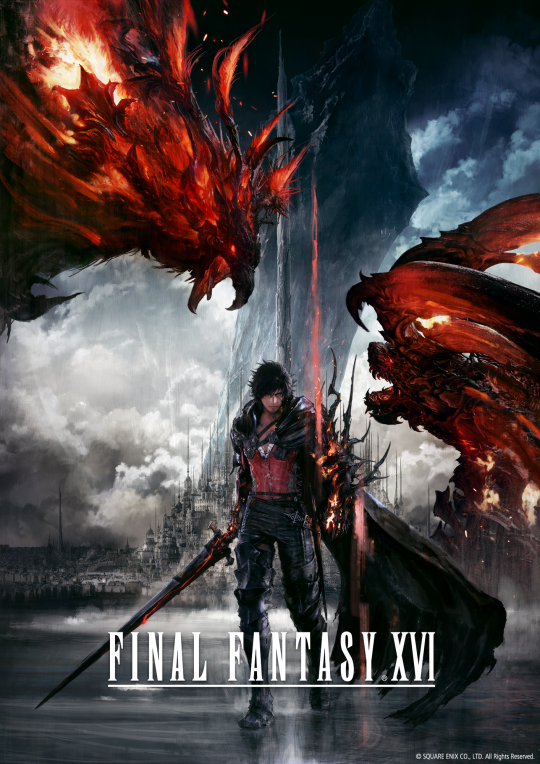
Final Fantasy XVI brings players into a world where Eikons are powerful and deadly creatures that reside within Dominants—a single man or woman who is blessed with the ability to call upon their dreaded power. The story follows Clive Rosfield, a young man dedicated to mastering the blade, who is dubbed the First Shield of Rosaria and tasked to guard his younger brother Joshua—the Dominant of the Phoenix. Unexpected events set Clive on a dark and dangerous road to revenge.
■ World
Valisthea―A Land Blessed in the Light of the Mothercrystals
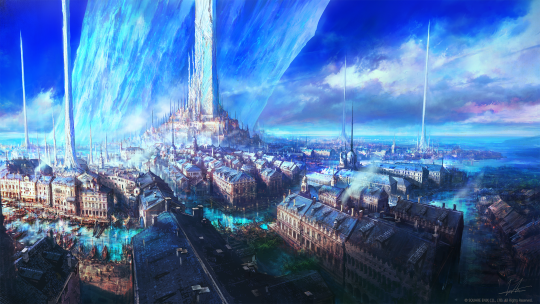
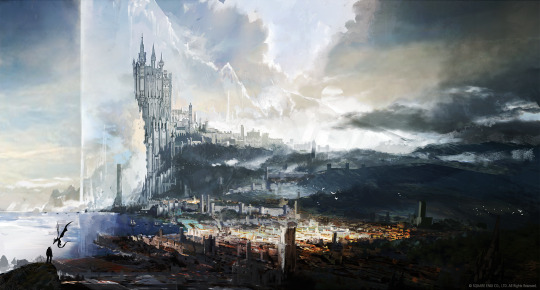
The land of Valisthea is studded with Mothercrystals—glittering mountains of crystal that tower over the realms around them, blessing them with aether. For generations, people have flocked to these beacons to take advantage of their blessing, using the aether to conjure magicks that let them live lives of comfort and plenty. Great powers have grown up around each Mothercrystal, and an uneasy peace has long reigned between them. Yet now the peace falters as the spread of the Blight threatens to destroy their dominions.
Eikons and Their Dominants
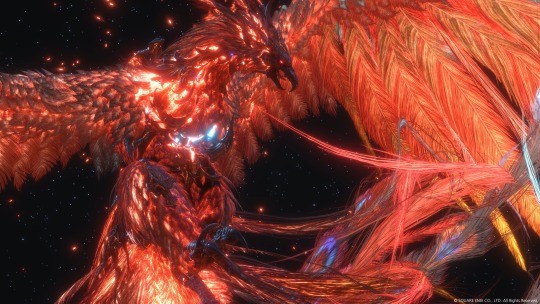
The Eikons are the most powerful and deadly creatures in Valisthea. Each resides within a Dominant—a single man or woman who is blessed with the ability to call upon their dread power. In some nations these Dominants are treated as royalty in admiration of this strength—in others they are bound in fear of it, and forced to serve as weapons of war. Those who are born as Dominants cannot escape their fate, however cruel it may be.
The Realms of Valisthea
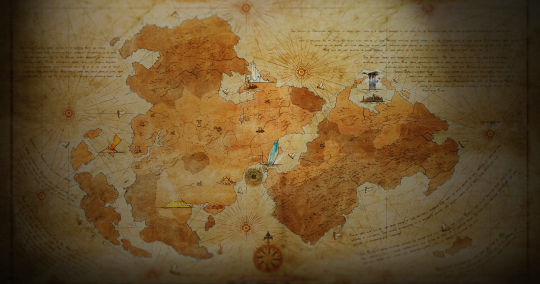
—The Grand Duchy of Rosaria
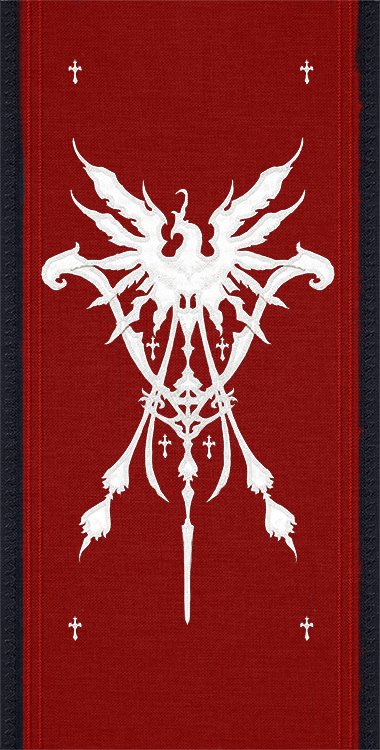
Long ago, a group of small independent provinces in western Valisthea found strength in unity, and formed the Grand Duchy of Rosaria. After years of relative prosperity, the duchy now finds itself threatened by the spread of the Blight—a threat that, left unchecked, would doubtless usher the realm to ruin. Rosaria draws its aether from Drake’s Breath, a Mothercrystal situated on a volcanic island off the coast. The Dominant of the Phoenix, Eikon of Fire, is enthroned as Archduke when they come of age.
—The Holy Empire of Sanbreque
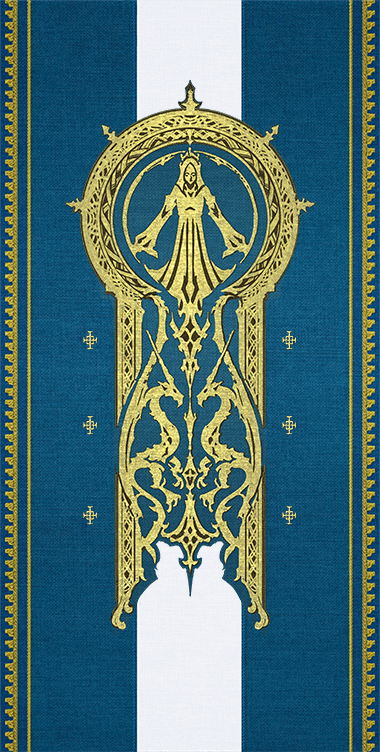
Sanbreque is the largest theocratic force in Valisthea. The Empire’s holy capital Oriflamme is built around Drake’s Head, the Mothercrystal that blesses the surrounding provinces with abundant aether. The people happily take advantage of this, living in comfort and security under the watchful gaze of the Holy Emperor, whom they worship as the living incarnation of the one true deity. The Dominant of serves as the empire’s champion, taking to the field in times of war to rout its enemies.
—The Kingdom of Waloed
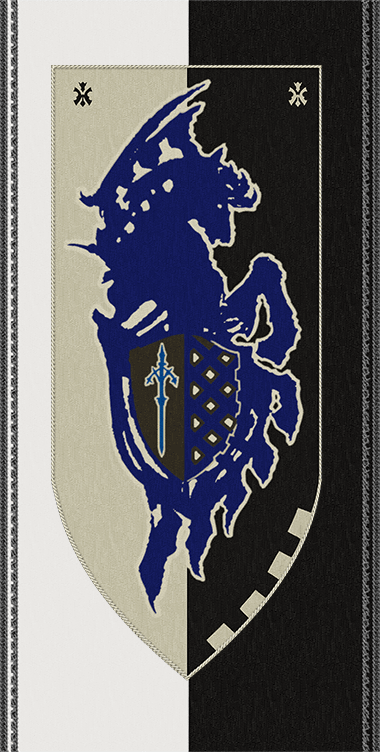
Waloed claims the entirety of Ash, the eastern half of Valisthea, as its dominion. The kingdom’s control of the continent has oft been tested by the orcs and other beastmen who make their home there, but the current ruler of the realm—Dominant of —has succeeded in quelling their rebellions. Using the power of the kingdom’s Mothercrystal, Drake’s Spine, this new king has built up a mighty army, with which he now seeks to test the borders of his neighbors.
—The Dhalmekian Republic
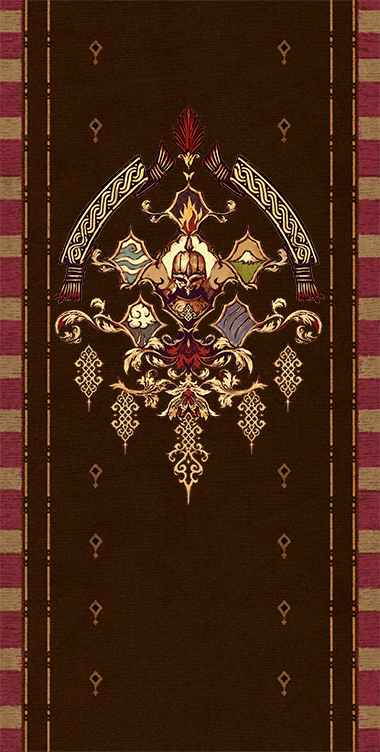
The Dhalmekian Republic is made up of five states, from which the members of its ruling parliament are drawn. Its Mothercrystal, Drake’s Fang, is half-hidden in the heart of a mountain range—the republic’s control over it, and its aether, securing the obedience of the large part of southern Valisthea. The Dominant of Titan, Eikon of Earth, is installed as a special advisor to parliament and has a significant say in its decision-making.
—The Iron Kingdom
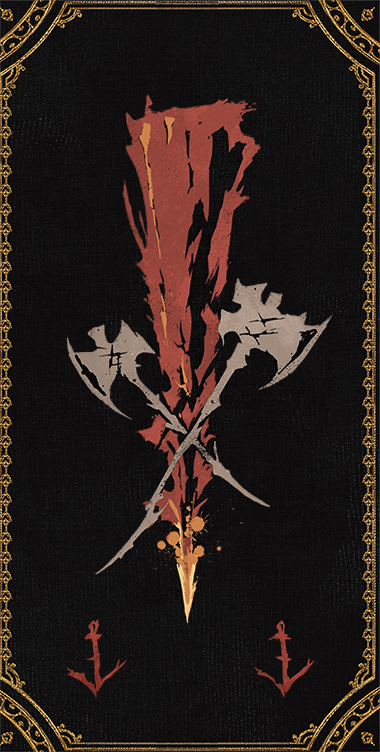
A small group of islands off the coast of Storm, the western half of Valisthea’s twin realms. Here the Crystalline Orthodox, an extreme faith that worships crystals, reigns supreme. The Iron Kingdom controls Drake’s Breath, the Mothercrystal that sits at the heart of one of their islands—long a source of contention with neighboring Rosaria. Isolated and aloof from the mainland nations, the Ironblood speak their own language. Orthodox doctrine judges Dominants to be unholy abominations, and any unlucky enough to be born on the islands are executed.
—The Crystalline Dominion
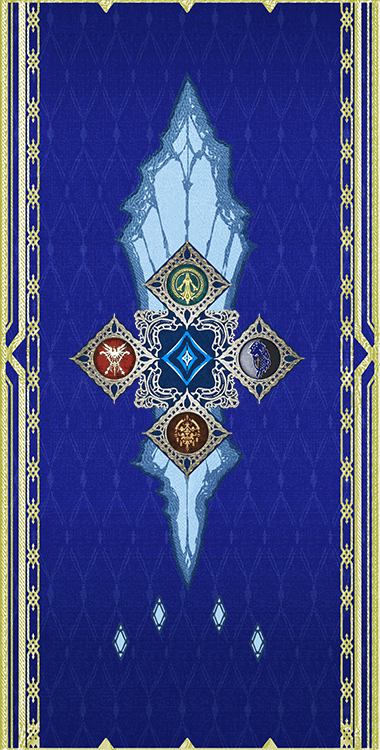
The Crystalline Dominion sits at the heart of Valisthea, built around the tallest of all the Mothercrystals, Drake’s Tail. Many bloody battles were fought for control of this small plot of land due to its strategic importance, till the warring realms finally agreed to an armistice. As part of the peace treaty, the islands around Drake’s Tail became an autonomous dominion led by a council of representatives from the surrounding nations—each realm enjoying equal claim to the Mothercrystal’s blessing. No Dominant makes their home there.
■ Characters
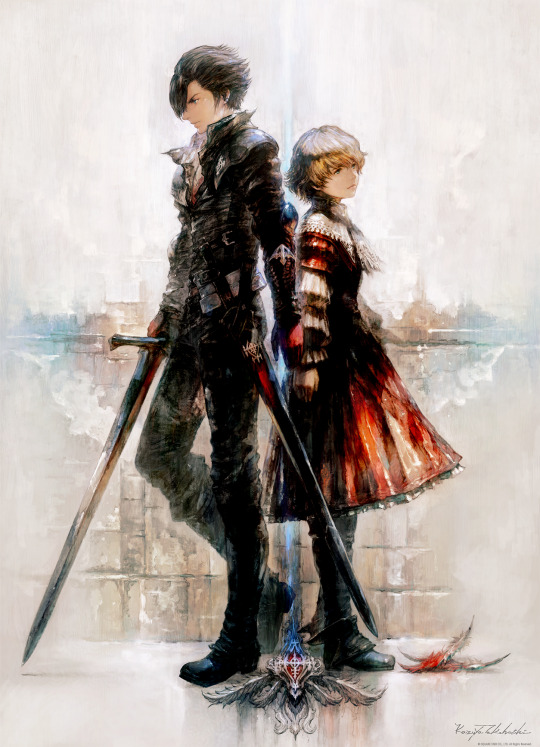
character artwork by Kazuya Takahashi
Clive Rosfield (age 15)
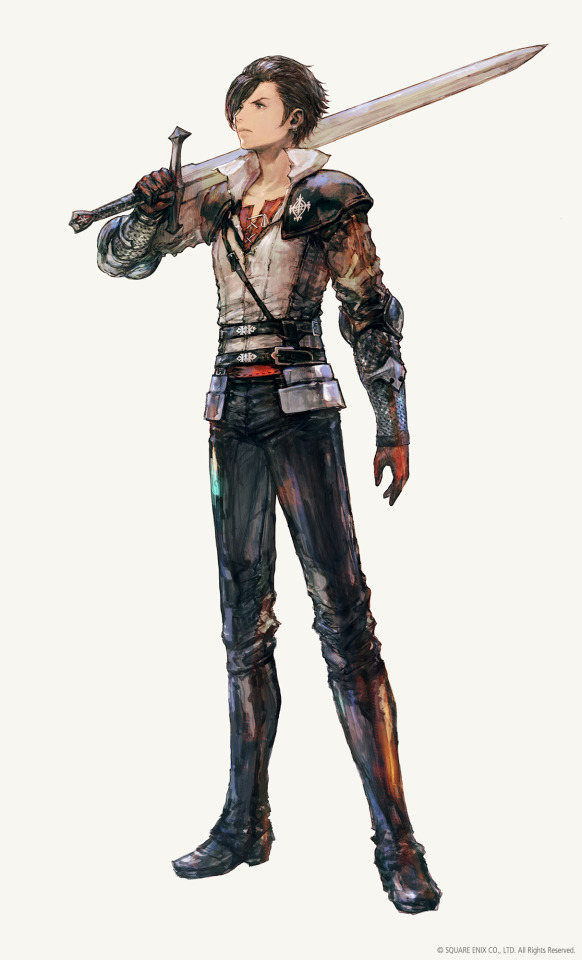
The firstborn son of the Archduke of Rosaria. Though all expected him to inherit the Phoenix’s flames and awaken as its Dominant, destiny instead chose his younger brother Joshua to bear this burden. In search of a role of his own, Clive dedicated himself to mastering the blade. His practice pays off when, at just fifteen years of age, he wins the ducal tournament and is dubbed the First Shield of Rosaria—tasked to guard the Phoenix and blessed with the ability to wield a part of his fire. Alas, Clive’s promising career is to end in tragedy at the hands of a mysterious dark Eikon, Ifrit, setting him on a dangerous road to revenge.
Joshua Rosfield (age 10)
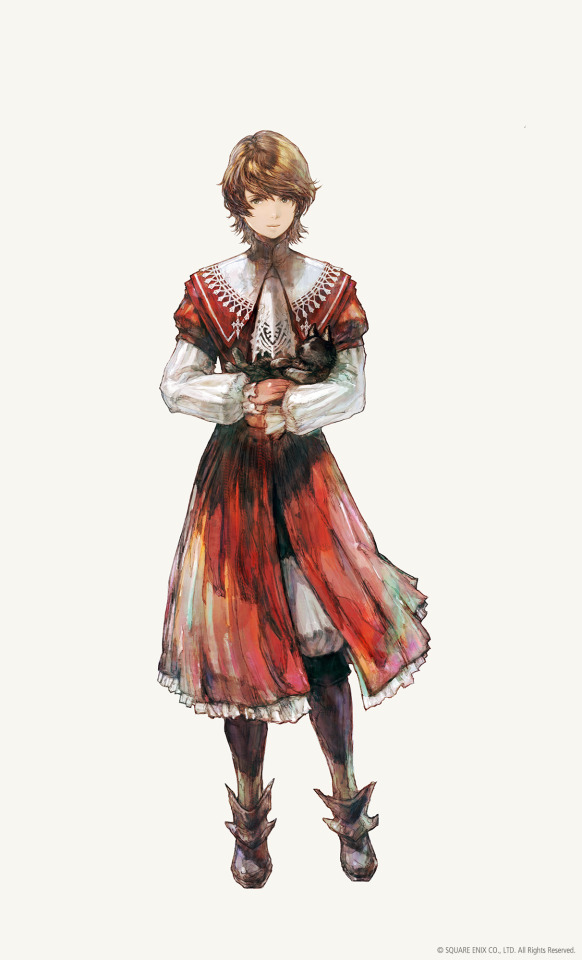
The second son of the Archduke of Rosaria and Clive’s younger brother by five years. Joshua awoke as the Dominant of the Phoenix soon after his birth. Despite his noble upbringing, Joshua treats all his father’s subjects with warmth and affection—none more so than Clive, whom he deeply admires. Joshua often laments that it was he, the frail and bookish younger son, who was granted command of the firebird’s flames, and not his stronger, braver brother. While Clive will gladly throw himself into any danger, Joshua quails at the sight of a carrot on his dinner plate. But carrots become the least of his concern when he, too, is swept up into the tragic events that change Clive’s life forever.
Jill Warrick (age 12)
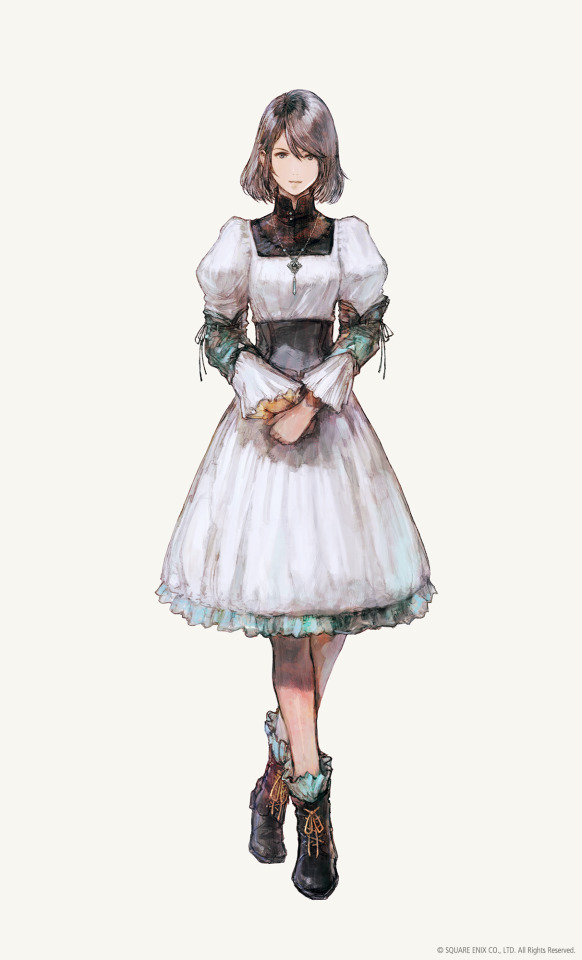
Born in the fallen Northern Territories, Jill was taken from her homeland at a tender age to become a ward of Rosaria, securing peace between the two warring nations. The Archduke insisted that she be raised alongside his sons, and now, at twelve years of age, she is as much a part of the Rosfield household as Clive and Joshua. Ever kind, gracious, and unassuming, Jill has become a trusted confidant to the brothers.
Final Fantasy XVI is in development for PlayStation 5.
274 notes
·
View notes
Text
The Pelle/Dani Receipts: Post One, Introduction
Hello and welcome to Rimanez and AnonLady present: Midsommar: The Pelle/Dani Receipts.
Are you sitting comfortably? Got your tea with special properties, rune-stitched white linen solstice clothing, and flower crown? Then let’s begin. Skål!
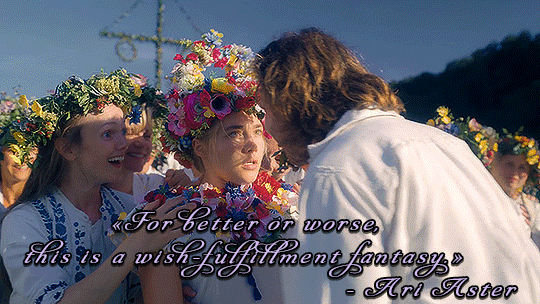
We are going to step you through the film more-or-less chronologically, detailing evidence supporting the Pelle/Dani ship in dialogue and behavior, cinematography, costuming, set design, and artwork featured throughout the film. This will include not just the signs that Pelle loves Dani--compelling, but low-hanging fruit when discussing this ship--but that Dani has feelings for Pelle, that their onscreen intimacy indicates a friendship, at least, that is independent of their individual relationships to Christian, and that Dani and Pelle are destined for each other. We should note that Ari Aster is meticulous, so meticulous, and it’s possible there are still things we have missed and perhaps some of our interpretations you may disagree with. That’s fine! We’ve got a lot to work with here. Additionally, while we will touch on elements relating to Dani’s destiny as May Queen, we will concentrate on those elements that pertain to her destiny with Pelle specifically.
There will be 12 individual posts, which Rimanez and I will be posting over the course of the next week or so as we get them ready, two at a time, with each post hyperlinked to the succeeding post, and then at the end, we’ll have a convenient table of hyperlinks.
All gifs and high quality images have been wrangled by @amy-amell. Rune expertise will be provided by @daydreamers.
Before we get into specific evidence, a brief word about general motifs to be aware of in Midsommar. These are not things that directly speak to the Pelle/Dani romance, but will feature in scenes we discuss and contribute to their meaning. These include:
The color yellow. Yellow generally relates to Dani’s journey, her yellow brick road. For example: the prevalence of the color in the Ardor house, particularly in pictures of Dani and the flower arrangement over the bedside picture of her; the hose that Terri uses to pipe the gas fumes into the upstairs is yellow; the path through the woods to Hårga features a thickening carpet of yellow flowers; the yonic sun gate to Hårga is yellow; Dani’s flower crown during the competition is mainly yellow; the Fire Temple, of course, is bright yellow.
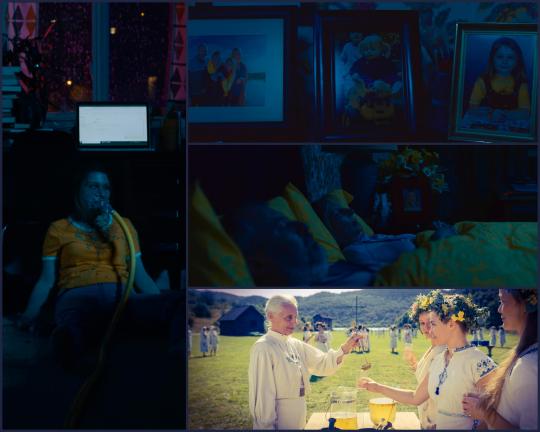
The sun. While they’re not sun worshipers, per se, the sun is the ultimate symbol of Hårgan belief in the Great Cycle. It also effectively doubles as a symbol for Dani’s destiny to join the family at the end, folding in the significance of the color yellow. Also note that in Old Norse myth, the sun is female and the moon is male, as opposed to Western traditions, which makes sense since, while it’s not explicitly stated, Hårga seems to be a matriarchy, with Siv as head honcho and the May Queen ultimately given the power of life and death in the Fire Temple ceremony.
The color blue. Blue generally relates to the Hårgans. You will notice it in their special solstice clothes’ embroidery, but also in sneakier places, like the lit trees behind Christian as he approaches Dani’s apartment to, sigh, sorta hold her in the beginning.
Flowers and plants. Flowers, plants everywhere. Not just real ones, but design elements, too, everywhere from Dani’s parents’ room to Hårga. Flowers, of course, have their own subtle language -- brilliantly and comprehensively explored in this post -- not unlike the Hårgans, but you will notice their presence waxes as Dani comes home to Hårga. In addition to the individual meanings of certain plants and flowers, note their generic connotations of sex, nature, growth, and balance. As Pelle muses in the meadow, “Nature just knows instinctually how to stay in harmony.” And that’s the essence of Dani’s journey: finding the harmony and balance she lacks.
Mirrors. Mirrors indicate something going on beneath the surface. We first see Dani’s parents, apparently sleeping, reflected in their bedroom mirror as Dani’s call goes to voicemail, only to learn they were actually dead. Christian’s lies to Dani, his friends, and himself are reflected in mirrors at Dani’s apartment and his own. Dani has her terrifying glimpse of Terri in the bathroom mirror. We first meet Maja primping in a mirror, and we soon learn she’s not just primping but primping for a plot. And most importantly for this piece, we see Pelle reflected in a mirror while sketching the newly-crowned May Queen, but of course, even in that idyllic moment, he is still plotting to get Christian out of the way. Mirrors = look again.
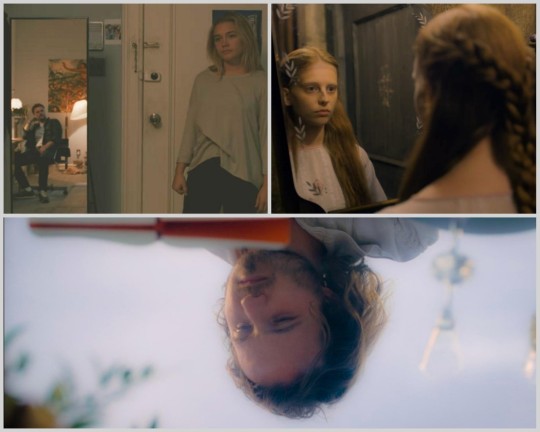
OK, with those principal motifs set to one side, let’s look at general underlying evidence of Pelle and Dani destiny, shall we?
Names. Dani Ardor. Ardor means love or passion and it comes from the Latin word ardere: to burn. Her first name, like sister Terri’s, is a male-sounding female name, a time-honored convention for Final Girls in horror movies. It also recalls Danny from The Shining (1980), a film that is referenced visually in the soaring overhead shots of the journey to Hårga, but also in the design of Dani’s bedsheet in the Hårgan Youth House.
It’s also worth noting that Dani is a common short form of Danielle, which literally means “God is my judge.” Taken alongside Dani’s ultimate judging of Christian, that’s...pretty suggestive. (Big thanks to @henrys-side-blog for pointing this out!)
Pelle is a name on its own and a pet form of Per, both Swedish forms of Peter, from the Greek petros, stone or rock, i.e. the foundation. It brings to mind the Ättestupa, the ultimate symbol of Hårgan unity, and the way that Pelle offers himself as a support for Dani, too. There’s also the association with Peter, the disciple who denied Christ. I mean...his romantic rival’s name is Christian, although Ari Aster says there are lots of ways to read Christian’s naming...which he won’t tell us. “He is thrown to the lions, so to speak.”
Lastly, this may just be a coincidence, but Dani has unique pronunciations of both Pelle and Christian that differ from the way the rest of the cast pronounces their names. (OK, I think Mark says Pell-ay once.) This is in spite of Florence Pugh’s flawless American accent, and it’s not replicated with any characters that aren’t Dani’s love interests. It’s just weird.
Dani and Pelle’s Costuming. After arriving, Pelle initially only dons a Hårgan shirt while retaining the rest of his outsider clothing. Dani dons a Hårgan apron initially before changing into full Hårgan costume for the maypole dance. Their costuming throughout the movie, as with many of their movements and behaviors, show a continuous synchrony that also charts Dani’s assimilation into the family. It’s worth noting that Pelle doesn’t kiss her until they are both in full Hårgan dress.
Runes are another big underlying source of meaning, but frankly, they are so complex and multivalent, including elements that we only really discovered while working on this post, they are going to get their own section at the end, where all of our contextual evidence will help guide interpretation.
OK, let’s crack the film open and find us a love story.
The Pelle/Dani Receipts Masterpost
217 notes
·
View notes
Link
Square Enix has launched the teaser website for Final Fantasy XVI, which features the key artwork and information on the game’s setting and main characters.
Get the details below.
■ Key Visual
—Protagonist, Clive Rosfield, on a dark and dangerous road to revenge.
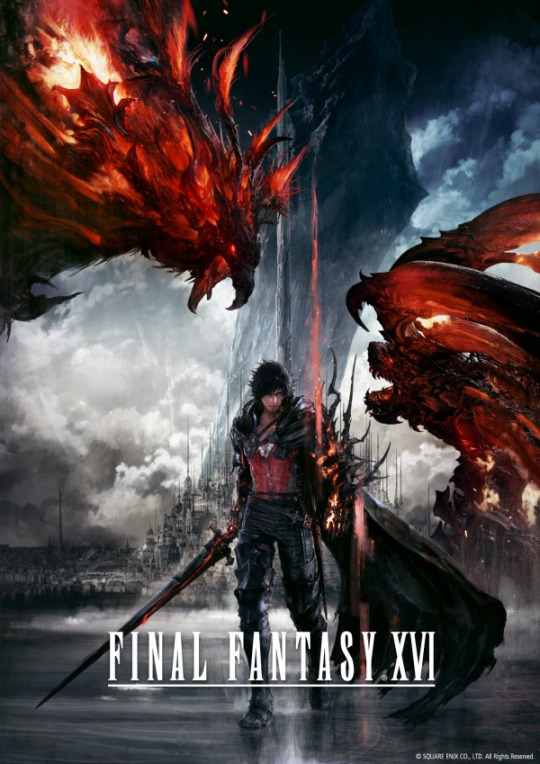
Final Fantasy XVI brings players into a world where Eikons are powerful and deadly creatures that reside within Dominants—a single man or woman who is blessed with the ability to call upon their dreaded power. The story follows Clive Rosfield, a young man dedicated to mastering the blade, who is dubbed the First Shield of Rosaria and tasked to guard his younger brother Joshua—the Dominant of the Phoenix. Unexpected events set Clive on a dark and dangerous road to revenge.
■ World
Valisthea―A Land Blessed in the Light of the Mothercrystals
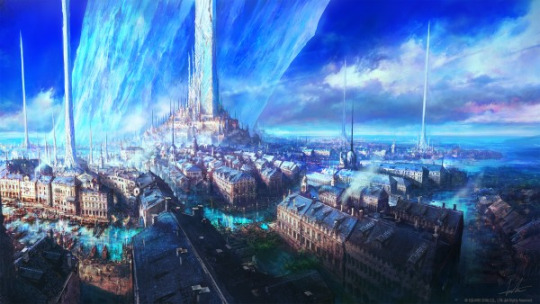
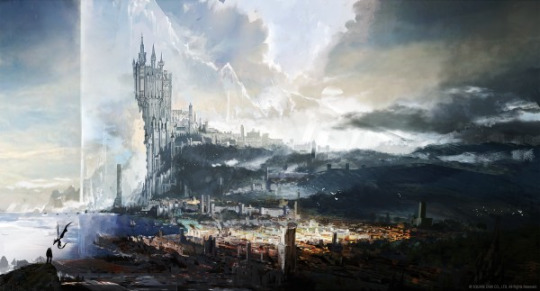
The land of Valisthea is studded with Mothercrystals—glittering mountains of crystal that tower over the realms around them, blessing them with aether. For generations, people have flocked to these beacons to take advantage of their blessing, using the aether to conjure magicks that let them live lives of comfort and plenty. Great powers have grown up around each Mothercrystal, and an uneasy peace has long reigned between them. Yet now the peace falters as the spread of the Blight threatens to destroy their dominions.
Eikons and Their Dominants
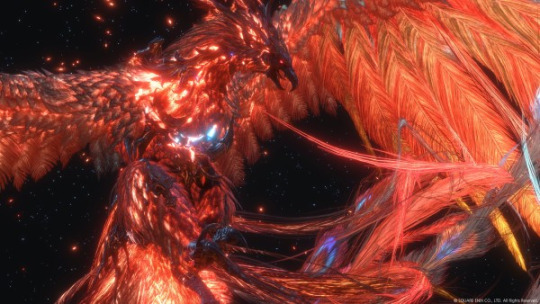
The Eikons are the most powerful and deadly creatures in Valisthea. Each resides within a Dominant—a single man or woman who is blessed with the ability to call upon their dread power. In some nations these Dominants are treated as royalty in admiration of this strength—in others they are bound in fear of it, and forced to serve as weapons of war. Those who are born as Dominants cannot escape their fate, however cruel it may be.
The Realms of Valisthea
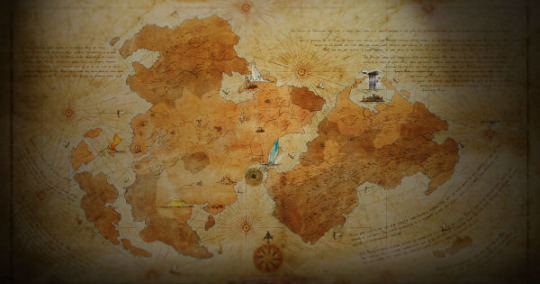
—The Grand Duchy of Rosaria

Long ago, a group of small independent provinces in western Valisthea found strength in unity, and formed the Grand Duchy of Rosaria. After years of relative prosperity, the duchy now finds itself threatened by the spread of the Blight—a threat that, left unchecked, would doubtless usher the realm to ruin. Rosaria draws its aether from Drake’s Breath, a Mothercrystal situated on a volcanic island off the coast. The Dominant of the Phoenix, Eikon of Fire, is enthroned as Archduke when they come of age.
—The Holy Empire of Sanbreque
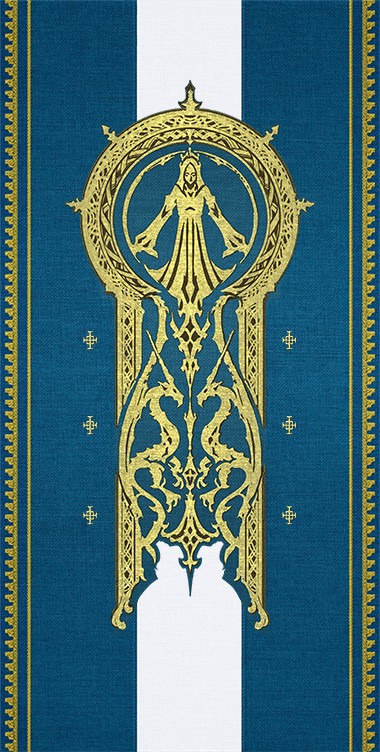
Sanbreque is the largest theocratic force in Valisthea. The Empire’s holy capital Oriflamme is built around Drake’s Head, the Mothercrystal that blesses the surrounding provinces with abundant aether. The people happily take advantage of this, living in comfort and security under the watchful gaze of the Holy Emperor, whom they worship as the living incarnation of the one true deity. The Dominant of serves as the empire’s champion, taking to the field in times of war to rout its enemies.
—The Kingdom of Waloed
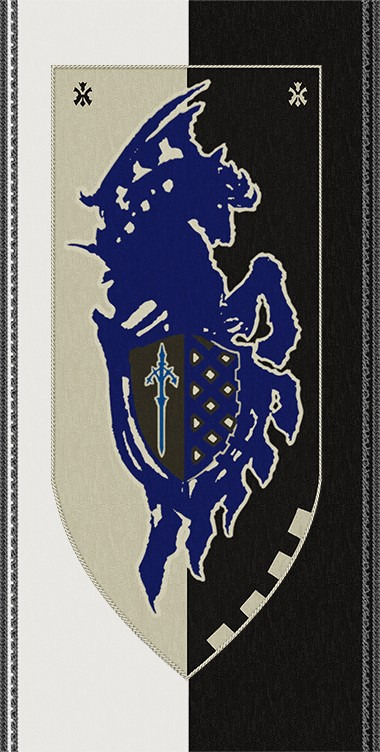
Waloed claims the entirety of Ash, the eastern half of Valisthea, as its dominion. The kingdom’s control of the continent has oft been tested by the orcs and other beastmen who make their home there, but the current ruler of the realm—Dominant of —has succeeded in quelling their rebellions. Using the power of the kingdom’s Mothercrystal, Drake’s Spine, this new king has built up a mighty army, with which he now seeks to test the borders of his neighbors.
—The Dhalmekian Republic
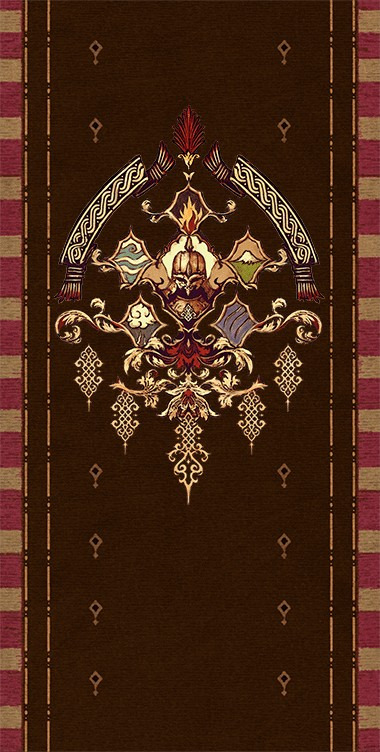
The Dhalmekian Republic is made up of five states, from which the members of its ruling parliament are drawn. Its Mothercrystal, Drake’s Fang, is half-hidden in the heart of a mountain range—the republic’s control over it, and its aether, securing the obedience of the large part of southern Valisthea. The Dominant of Titan, Eikon of Earth, is installed as a special advisor to parliament and has a significant say in its decision-making.
—The Iron Kingdom
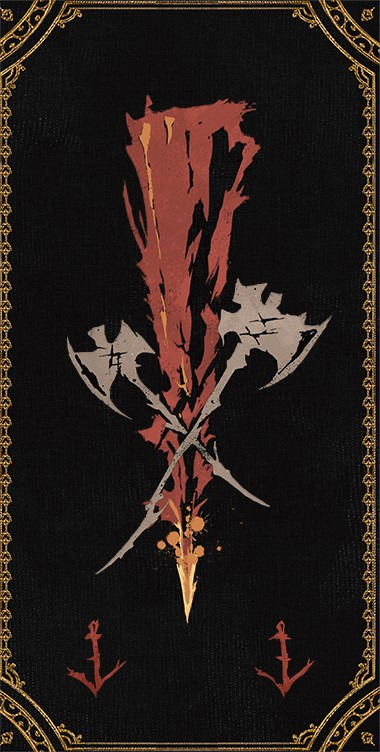
A small group of islands off the coast of Storm, the western half of Valisthea’s twin realms. Here the Crystalline Orthodox, an extreme faith that worships crystals, reigns supreme. The Iron Kingdom controls Drake’s Breath, the Mothercrystal that sits at the heart of one of their islands—long a source of contention with neighboring Rosaria. Isolated and aloof from the mainland nations, the Ironblood speak their own language. Orthodox doctrine judges Dominants to be unholy abominations, and any unlucky enough to be born on the islands are executed.
—The Crystalline Dominion
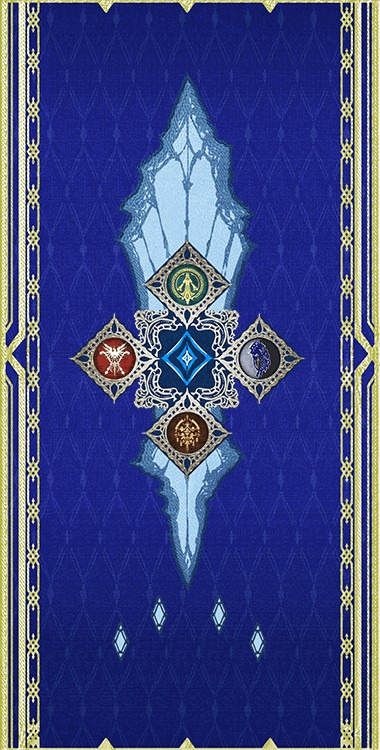
The Crystalline Dominion sits at the heart of Valisthea, built around the tallest of all the Mothercrystals, Drake’s Tail. Many bloody battles were fought for control of this small plot of land due to its strategic importance, till the warring realms finally agreed to an armistice. As part of the peace treaty, the islands around Drake’s Tail became an autonomous dominion led by a council of representatives from the surrounding nations—each realm enjoying equal claim to the Mothercrystal’s blessing. No Dominant makes their home there.
■ Characters

Clive Rosfield
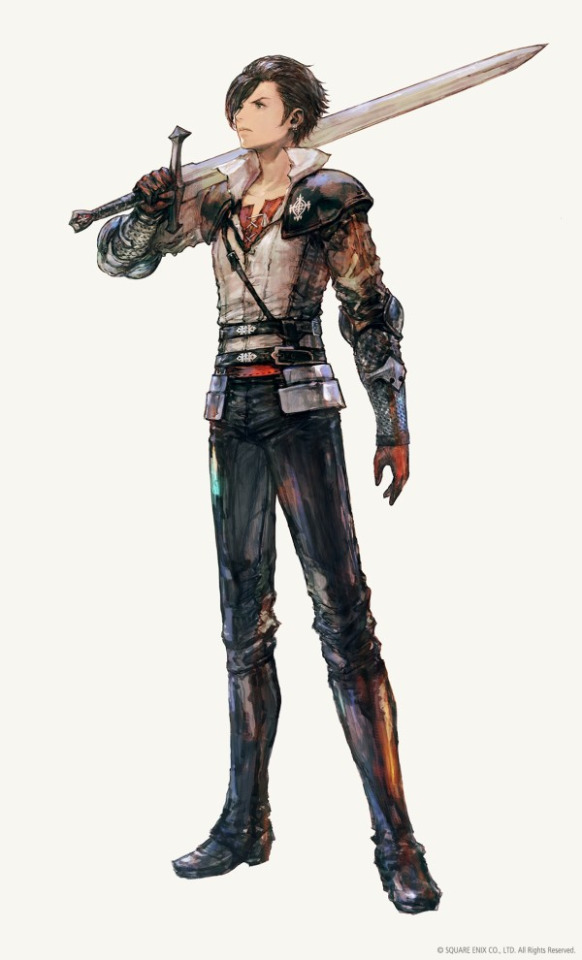
The firstborn son of the Archduke of Rosaria. Though all expected him to inherit the Phoenix’s flames and awaken as its Dominant, destiny instead chose his younger brother Joshua to bear this burden. In search of a role of his own, Clive dedicated himself to mastering the blade. His practice pays off when, at just fifteen years of age, he wins the ducal tournament and is dubbed the First Shield of Rosaria—tasked to guard the Phoenix and blessed with the ability to wield a part of his fire. Alas, Clive’s promising career is to end in tragedy at the hands of a mysterious dark Eikon, Ifrit, setting him on a dangerous road to revenge.
Joshua Rosfield
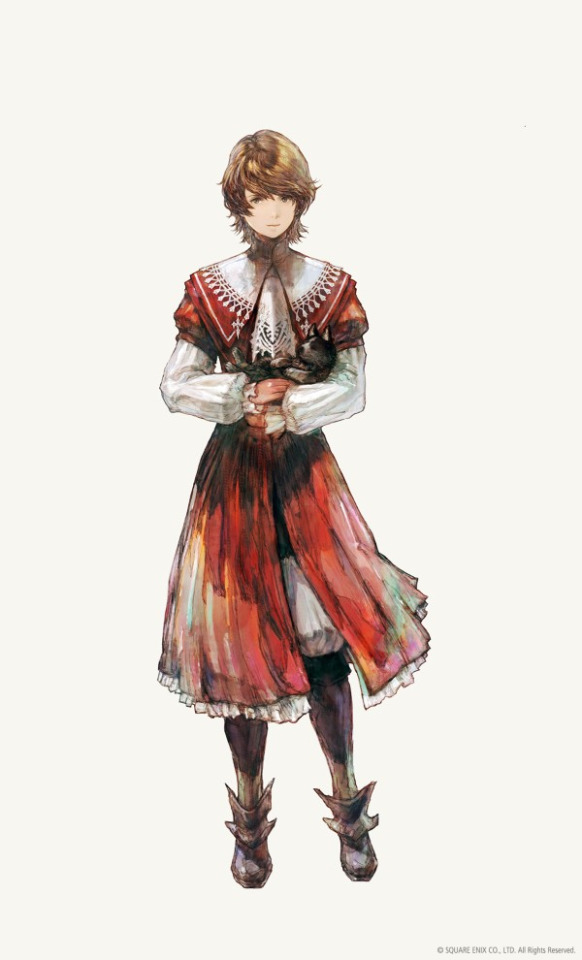
The second son of the Archduke of Rosaria and Clive’s younger brother by five years. Joshua awoke as the Dominant of the Phoenix soon after his birth. Despite his noble upbringing, Joshua treats all his father’s subjects with warmth and affection—none more so than Clive, whom he deeply admires. Joshua often laments that it was he, the frail and bookish younger son, who was granted command of the firebird’s flames, and not his stronger, braver brother. While Clive will gladly throw himself into any danger, Joshua quails at the sight of a carrot on his dinner plate. But carrots become the least of his concern when he, too, is swept up into the tragic events that change Clive’s life forever.
Jill Warrick
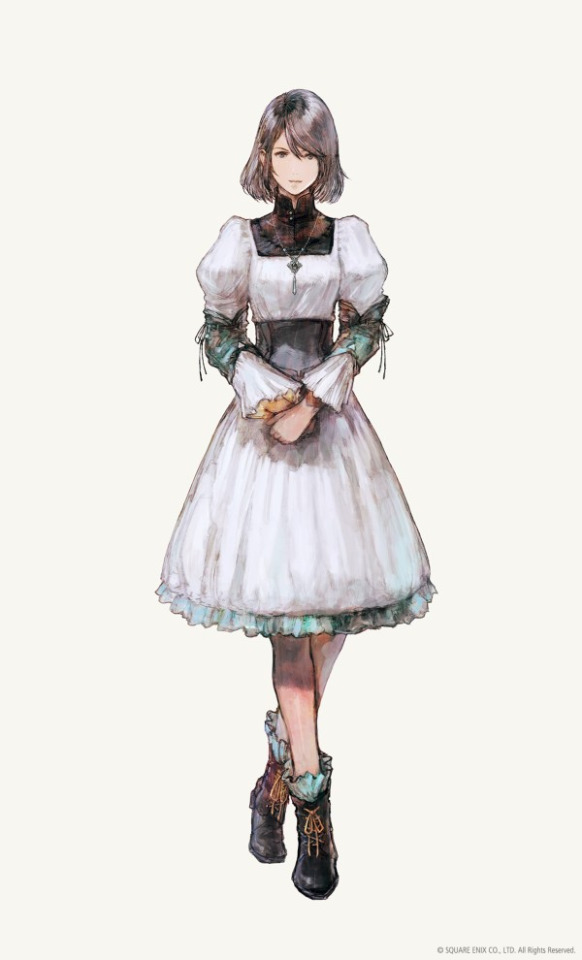
Born in the fallen Northern Territories, Jill was taken from her homeland at a tender age to become a ward of Rosaria, securing peace between the two warring nations. The Archduke insisted that she be raised alongside his sons, and now, at twelve years of age, she is as much a part of the Rosfield household as Clive and Joshua. Ever kind, gracious, and unassuming, Jill has become a trusted confidant to the brothers.
Final Fantasy XVI is in development for PlayStation 5.
View the artwork above in high-resolution at the gallery.
53 notes
·
View notes
Text
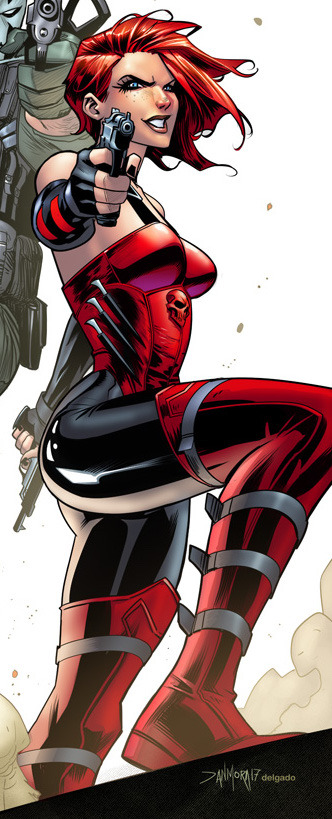
History
Are you watching from your pit in Hell, father? Do you understand now? That it was always my destiny... never yours. The Red Skull's failure will be his daughter's triumph... and I will reshape this world.SIN
Early Life
Sinthea "Sin" Shmidt is the daughter of the Red Skull. Seeking a male heir, the Red Skull fathered a daughter with a washerwoman. The woman died in childbirth, and the Red Skull almost killed the child, angry that it was a girl and not the boy he expected. One of his followers, Susan Scarbo, convinced him not to, telling him she would raise the girl herself as her nanny. The Skull agreed and left the girl (now named Sinthea) to be raised by Scarbo, who indoctrinated her with the Skull's views as she grew up. The Skull returned when Sinthea was a child and put her in a special machine that accelerated her aging process until she was an adult and gave her superhuman powers.[7]
Mother Superior
Afterwards, as Mother Superior, Sinthea became the leader of a group called the Sisters of Sin; young orphan girls who were accelerated into adulthood and given powers by the Red Skull after being indoctrinated by Sinthea. The Sisters of Sin would have many run-ins with the Red Skull's nemesis Captain America before being de-aged when they entered a chamber designed to reverse the Skull's aging process to assault Captain America - who had suffered through the Skull's process and had become elderly - while he was using it to return himself to normal, and they were reverted to children at the same time Captain America was restored (she would later claim she was de-aged to the wrong age - but whether this is true, and in which direction, is unclear).[8]
Sister Sin
Later, Scarbo (now calling herself Mother Night), reformed the Sisters of Sin and became their new leader, while the de-aged Sinthea took the name Sister Sin.[9]
Sin
Sinthea was later captured by S.H.I.E.L.D. and taken to their re-education facility, where they attempted to reprogram her to be a "normal" American girl and gave her false memories to that effect. Later, the Red Skull was assassinated by the Winter Soldier under the orders of Aleksander Lukin, and one of the Skull's henchmen, Crossbones, broke into the facility and kidnapped Sinthea. Crossbones tortured Sinthea to break S.H.I.E.L.D's conditioning. After he succeeded, she entered into a relationship with him, and - with Sinthea now calling herself simply Sin - the two went on a killing spree. They later reunited with the Skull, now living inside the mind of General Lukin.[10]
As the first part of the Skull's Master Plan, Sin disguised herself as a nurse after the Civil War while Crossbones sniped Captain America at the courthouse, even though it meant obeying her father and abandoning Crossbones to his fate. Sin then revealed to Sharon Carter that she was the one who had killed Cap.[11]
While the Red Skull had control over Steve Rogers' body, Sin fought alongside Crossbones against the Avengers' forces. After Steve Rogers eventually regained control of his body, Sin was knocked unconscious. After the battle, and due to a subsequent explosion, Sin's face was left severely disfigured and scarred, leaving her a "red skull" appearance. Upon hearing the news, Norman Osborn quipped, 'Like father like daughter'.[12]
Sin was institutionalized at the Kurtzburg Institute for the Criminally Insane People. During a breakout/riot, she was approached by Helmut Zemo, who asks her to tell him how to kill Bucky Barnes. More recently, Sin was liberated from the asylum by Master Man who has proclaimed both his allegiance and affection to Sinthea as the new Red Skull: the heir to her (believed deceased) father's legacy. [4]
Fear Itself
After taking the Black Widow and Sam Wilson hostage, Sin sent one of her henchmen to disrupt the trial of Captain America and sent a demand: Bucky Barnes. After escaping with help from the manipulative Doctor Faustus, James confronted Sin and Master Man and brashly attempted to foil her escape. After the escape, Sin allied herself once more with Baron Zemo to retrieve the Book of the Skull, with which she would discover the whereabouts of a hammer her father summoned way back in 1942. After successfully retrieving the book and explaining its origins to Zemo, Sin betrayed him and went on her own to retrieve the hammer for herself.[13]
Sinthea as Skadi.Sin and her henchmen went to the stronghold of the Thule Society housing the hammer, invaded it and killed everyone who crossed her path. After finding the hammer and being deemed worthy by it, Sin, now as Skadi, went to set her new master, the Serpent, free.[6] At her father's order, Skadi led an assault on Washington D.C.,[14] during which, she almost killed Bucky Barnes.[15] Skadi soon reached New York, where she faced off against Steve Rogers, who had returned as Captain America.[16] There, she summoned the Serpent. When the Avengers tried to take him down, he broke Rogers' shield and knocked out the team.[17] By her father's side, Skadi and the other Worthy went to the fallen Asgard, in Broxton, Oklahoma, where they battled the Avengers once more. Sin was taken down by Rogers, who was wielding the mystic Mjolnir. After the Serpent was killed by Thor, Sin's hammer was taken from her by Odin, as well as the hammers of the other Worthy.[18]
Search for Power
Suddenly, Sin woke up in a hideout where strange people said they freed her from custody and they would help to find her hammer again.[18]
All-New Captain America
While on a mission to neutralize a new Hydra base in Ecuador, the new Captain America Sam Wilson was teleported along with his comrade, Nomad, from there to Helmut Zemo's palace in Bagalia through the Infinite Elevator. There, several super-agents of the new Hydra were expecting Cap and Nomad, with Sin being one of them.[19]
After Zemo killed Ian, Sam, with an undercover Misty Knight, that helped him before in a fight against Crossbones,[20] went to the Hydra's castle, only to be welcomed by Sin herself. There, the Red Skull's daughter faced Wilson while enjoying a reconstitution of the World War II through holographic technology. Sin started to mock Sam, saying that if it wasn't for her father, Sam wouldn't have become a hero, but only a low-level gangster by the name of "Snap Wilson". Sam, offended by her words, tried to attack her, only to discover that the Sisters of Sin were holding the members of his family, such as his sister and his niece, to ransom. If Sam attacked Sinthea, she'd order to her sisters to kill his family instantly. Sin made Sam give his shield and his wings to her, then ordered him to commit suicide by jumping off a cliff.
Soon after, she started a video conference with Crossbones, Baron Zemo and Taskmaster, saying that the plan to defame Wilson was successful and, after saying that she was better than her father, that she was the real and only Red Skull, she activated Zemo's plan: to spread worldwide the toxic blood of an Inhuman named Lucas, capable of sterilizing human beings, by launching a bomb into Earth's atmosphere. Zemo's plan was to create a new perfect world ruled by Hydra, as its agents would be the only fertile humans after the great leveling, thanks to the Inhuman boy's blood. It was then that Sin was attacked by Sam, who was rescued by his pet Redwing. Sin seemingly met her fate when the bomb containing Lucas' blood was destroyed by Cap.[21]
Return
Allying herself with the��telepathic clone of her late father, Sin proposed him to create a new Hydra and use its agents to create deadly machines and infiltrate spy agencies, much to his dismay. Suddenly, a child appeared in front of them, and used her powers to fix Sin's face, returning it to how it was before the explosion that disfigured it. The girl then proceeded to explain she was made of a shard of a Cosmic Cube that once belonged to the Red Skull. Taking advantage of the situation, the Red Skull devised a new plan for his new Hydra.[22]
Sin helped her father retrieve a black box, as well as all his gold, from his safe in a bank in Bagalia, being nearly caught by the Avengers Unity Squad in the process if not by the Red Skull, who used his telepathic abilities to disguise himself as Gambit, and to cloak Sin and the contents of the safe from them.[23]
Sin and the Red Skull hid out in a secret underground room in the Avengers Mansion, which was no longer used by the Avengers and had been converted into a tourist attraction. The pair was nearly discovered by Quicksilver and Deadpool of the Avengers Unity Division, but the Red Skull used his telepathy to convince the heroes that the room was empty.[24]
Sin later took her father to Pleasant Hill, a prison disguised as a small town where the realities of the criminals would be rewritten to turn them into powerless and common people, during Zemo's insurrection in order to the Red Skull to use Kobik to rewrite Steve Rogers' past, turning him into a loyal agent of Hydra at his service.[25][22]
Powers and Abilities
Power Grid [28]Intelligence 2Strength*6 2Speed* 3 2Durability*6 2Energy Projection*5 1Fighting Skills4 * Higher ratings with Hammer of Skadi.
Powers
As Mother Superior, Sin possessed a range of superhuman powers including telepathy, telekinesis, teleportation and intangibility. After she was de-aged, she apparently lost these powers completely - unlike the other "Sisters of Sin", whose powers were diminished but not eliminated upon de-aging. The reason for this discrepancy is currently unclear.[1][26]
With the Hammer of Skadi, Sin has the powers associated with wielding an enchanted Asgardian weapon.[1][26]
Abilities
Being trained by her father, she is an expert hand to hand combatant and martial artist. She is also highly proficient in firearms and explosives. As the Red Skull's child, Sin also has a high level of intellect.[1][26]
Strength level
Normal human female[1][26]
Weaknesses
Same as that of a normal human female[1][26
4 notes
·
View notes
Link
More Perfect Unions
Posted on May 17, 2020 by outcandour
Raise your hand if you’ve had Never My Love stuck in your head since the finale! Let’s discuss Season 5.
Warning- Contains spoilers from Outlander Season 5 and Episode 512: Never My Love.
Wholeness, noun:
the state of forming a complete and harmonious whole; unity
the state of being unbroken or undamaged
To be honest, I wasn’t entirely sure I would recap the finale episode. Episode 512 was beautifully executed, with some of Caitriona Balfe’s finest acting, but writing the recaps requires multiple episode viewings and this one was tough to rewatch. My family has also had a rough week with a sad diagnosis for one of our pets; emotionally I haven’t quite been up for it. And so, as a bit of a compromise, I thought I would not only reflect on the finale, but also the season in its entirety.
Beyond the deeply textured and stunning set and costume designs of Claire’s mid-century dissociative scenes in Episode 512, what stands out to me is who was included and how they are included in this imaginary safe space: Murtagh is alive, Jocasta has her sight, and Fergus has both hands. Jamie this season first tells Roger and then Claire, “You are alive. You are whole.” The family members in these dissociative scenes are alive. They are whole. The underlying message breaking through Claire’s subconscious: you will be safe.
And looking back on Season 5 we can see that “wholeness” is a theme repeatedly addressed. What does it mean to be whole? Can a man be complete with only one leg? Can your identity survive if you lose your voice? Are we permanently broken if we lose our spouse, a lover, or a family member? Can a family survive if its members leave…perhaps forever? Are we still spiritually intact if we take another’s life? The finishing- the wholeness– of the Big House is a continued story in nearly every episode. In a world where a shattered opal provides clues to the past and future, this season examines what it takes to feel complete. Spiritually and physically and on the eve of the American Revolution, our characters work toward a more perfect union of mind and body.
Back in December and February I made a number of predictions regarding Season 5 (you can read them here and here), and I argued that the tone being set for this season was religious in nature. From the choral music employed in the new opening credits, to the multiple biblical references in the episode titles (Free Will, Perpetual Adoration, Better to Marry Than Burn, Mercy Shall Follow Me), this season frequently references fate and faith. Our characters repeatedly examine their spiritual wholeness, questioning their actions, morality, and place in a universe where time travel is possible and the future can be known. Isn’t this playing God, Brianna asks? Genesis and many other creation stories tell us that humankind was made complete with a physical body and spiritual soul…man was made whole. Much of this season focuses on free will and destiny, with our characters struggling their way back to that original state of completion.
Physically, our characters “take stock” of themselves more than once this season…personally examining their wholeness. Jamie inspects his body on the morning of his birthday (The Ballad of Roger Mac), while Claire surveys her injuries following her rape and beating (Never My Love). In both these episodes, however, the true “taking stock” is of their mind and spirit following intense trauma– affirmations that life goes on after their worlds feel shattered…after their worlds feel not quite whole. Claire promises she will survive, while Jamie pushes through his grief in order to help his family. Physically and spiritually, they know they will heal.
We know it, too. After eight novels and five seasons with these characters, we know they are individually capable of survival. Jamie and Claire spent twenty years apart, learning and growing despite their separation. Brianna and Roger each independently traveled to the past, more or less successfully making their way to their intended goals. Fergus and Marsali both survived difficult childhoods to form their own loving (and large) family. Ian often moves through this world alone, with Rollo as his sole companion. Everyone in this family has repeatedly proved they are competent when alone.
Yet Season 5 argues that although our main characters are individually qualified, they are most whole when united: I will fight for you, I will be loyal to you, I belong here, I was thinking of home. As Jamie affirms in the finale, “It is myself who kills for [Claire].” Our characters fill in the gaps in each other’s lives– where one cannot go another will tread. They take turns killing and saving, confessing their sins and offering absolution. One will push as another pulls. In this way they are more complete when together… together they are most whole.
Wholeness this season, then, is an unsurprising union of the physical and spiritual. Jamie’s leg heals, but he comes to recognize that his entire being transcends his physicality. Roger regains his voice and his will to live. Ian contemplates ending his physical life, but eventually heals his spirit enough to overcome such thoughts. Brianna, Roger, and Jem physically come back to their family, also gaining a realization of their sense of belonging. In the end the Fraser family has succeeded in achieving those definitions of wholeness: united and unbroken in body and spirit.
The glimmer of promise from the Season 5 finale may indeed be in Claire’s affirmation that she feels safe. But the sign of hope for me comes a few minutes earlier in the episode. Throughout the course of this series Brianna has effortlessly quoted Nathan Hale, Herman Melville, and Robert Frost. “Never quote an American to an American,” Roger once told her, knowing we eagerly consume our own history when it is fed. And so here is Outlander, offering it to us by the spoonful. Like the country that is forming, the Fraser family stands united. The storm clouds loom, the American Revolution approaches. Beyond that distant North Carolina horizon thirteen colonies will come together as one. They will come together to be whole.
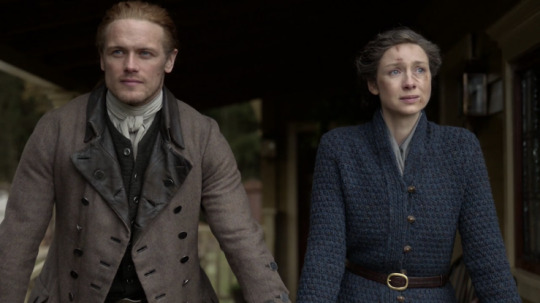
Slàinte
7 notes
·
View notes
Text
CHAPTER IV THE UNION OF ATTICA AND THE FOUNDATION OF THE ATHENIAN DEMOCRACY
SECT. I. THE UNION OF ATTICA
When recorded history begins, the story of Athens is the story of Attica, the inhabitants of Attica are Athenians. But Attica, like its neighbour Boeotia and other countries of Greece, was once occupied by a number of independent states. Some of these little kingdoms are vaguely remembered in legends which tell of the giant Pallas who ruled at Pallene under the north-eastern slopes of Hymettus, of the dreaded Cephalus lord of the southern region of Thoricus, or of Porphyrion of mighty stature whose domain was at Athmonon under Mount Pentelicus. The hill of Munychia was, in the distant past, an island, and was crowned by a stronghold; the name Piracus has been supposed to preserve the memory of days when the lords of Munychia looked across to the mainland and spoke of the "opposite shore." At a later stage we find neighbouring villages uniting themselves together by political or religious bonds. Thus in the north, beyond Pentelicus, Marathon and Oenoe and two other towns formed a tetrapolis. Again Piraeus, adjacent Phaleron, and two other places joined in the common worship of the god Heracles, and were called the Four-Villages. Of all the lordships between Mount Cithaeron and Cape Sunium the two most important were those of Eleusis and Athens, severed from one another by the hill-chain of Aegaleos.
It was upon Athens, the stronghold in the midst of the Cephisian plain, five miles from the sea, that destiny devolved the task of working out the unity of Attica. This Cephisian plain, on the south side open to the Saronic gulf, is enclosed by hills, on the west by Aegaleos, on the north-west by Parnes, on the east by Hymettus, while the gap in the north-east, between Parnes and Hymettus, is filled by the gable-shaped mass of Pentelicus. The river Cephisus flows not far from Athens to westward, but the Acropolis was girt by two smaller streams, the Ilīsus and the Eridănus. We have seen that it had been occupied as an abode of men in the third millennium, and that in the bronze age it was one of the strong places of Greece. There still remain pieces of the wall of grey-blue limestone with which the Pelasgian lords of the castle secured the edge of their precipitous hill." The old wall was called the Pelargikon, but in later times this name was specially applied to the ground on the north-western slope. The Acropolis is joined to the Areopagus by a high saddle, which forms its natural approach, and on this sidewalls were so constructed that the main western entrance to the citadel lay through nine successive gates. At the north-western corner a covered staircase led down to the well of Clepsydra, which supplied the fortress with water; and on the north side there were two narrow "postern" descents into the plain, much steeper than that at Tiryns. We may take it that all these constructions were the work of the Pelasgians and were inherited by their Greek successors.
The first Greeks who won the Pelasgic acropolis were probably the Cecropes, and, though their name was forgotten as the name of an independent people, it survived in another form. For the later Athenians were always ready to describe themselves as the sons of Cecrops. This Cecrops was numbered among the imaginary pre-historic kings of Athens; he was nothing more than the fabulous ancestor of the Cecropes. But the time came when other Greek dwellers in Attica won the upper hand over the Cecropes, and brought with them the worship of Athena. It was a momentous day in the history of the land when the goddess, whose cult was already established in many other Attic places, took possession of the hill which was to be pre-eminently, and for all time, associated with her name. The Acropolis became Athenai; the folks ––whether Cecropes or Pelasgians–– who dwelled in the villages around it, on the banks of the Ilīsus and Eridănus, became Athenians. The god whom the Cecropes worshipped on the hill, Poseidon Erechtheus,was forced to give way to the goddess. Legend told that Athena and Poseidon had disputed the possession of the Acropolis, and that each had set a token there, the goddess her sacred olive-tree,the god a salt-spring. The dethroned deity was not banished; there was a conciliation, characteristic of the Greek temper, between the old and the new. Erechtheus in the shape of a snake is permitted still to live on the hill of Athena, and the oldest temple that was built for the goddess, harboured also the god. In later times Athenian "history" transformed Erechtheus into a hero, and regarded him, like Cecrops, as one of the early kings.
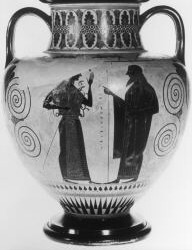
Athena and Poseidon on a vase painted by Amasis
There was another god who was closely associated in Attic legend with Athena, and Athens was distinguished by the high honour in which she held him. This was Hephaestus, the divine smith, the master and helper of handicraftsmen, the cunning giver of wealth. But we cannot say how far back his worship in Attica goes, or when his special feasts were instituted. It is probable that his honour grew along with the prosperity of the craftsmen. An Athenian poet calls his countrymen "sons of Hephaestus," and, according to one myth, it was from his seed that all the earth-born inhabitants of Attica were sprung. At the feast of Apaturia, in the last days of autumn, when children were admitted into the Phratries by a solemn ceremony, the fathers used to light torches at the hearth and sing a hymn to the lord of fire.
The next great step in Attic history was the union of the land.We cannot be certain at what time this union took place; it recedes beyond the beginnings of recorded history; and we can only dimly discern how it was brought about. When the lords of the Acropolis had subdued their own Cephisian plain, from Mount Parnes to the hill of Munychia, from the slopes of Hymettus to Aegaleos, they were tempted to extend their power eastward into the "Midland beyond Mount Hymettus, and subdue the southern "acté," wedge of land which ends in the lofty cape of Sunium. The completion of this conquest was possibly the first great achievement of Athens, and the second was probably the subjugation of the north-eastern plain of Marathon and the "tetrapolis." Thus the first stage in the union of Attica is the reduction of the small independent sovereignties throughout all the land, except the Eleusinian plain in the west, under the loose overlordship of Athens.
In the course of time the feeling of unity in Attica became so strong that all the smaller lordships, which formed parts of the large state, but still retained their separate political organisations,could be induced to surrender their home governments and merge themselves in a single community with a government centralised in the city of the Cephisian plain. The man of Thoricus or Aphidnae or Icaria now became a citizen of Athens and his political rights must be exercised there. The memory of this synoecism was preserved in historical times by an annual feast, and it was fitting that it should be so remembered, for it determined the whole history of Athens. From this time forward she is no longer merely the supreme city of Attica. She is neither the head of a league of partly independent states, nor yet a despotic mistress of subject-communities. She is not what Thebes is to become in Boeotia, or what Sparta is in Laconia. If she had been, and she might well have been, either of these things, her history would have been gravely altered. She is the central city of an united state; and to the people of every village in Attica belong the same political rights as to the people of Athens herself. The man of Marathon or the man of Thoricus is no longer an Attic, he is an Athenian. It is generally supposed that the synoecism was the work of one of the kings. It was undoubtedly the work of one man; but it is possible that it belongs to the period immediately succeeding the abolition of the royal power.
In after-times the Athenians thought that the hero Theseus,whom they had enrolled in the list of their early kings," was the author of the union of their country. But at the period when that union was brought about Theseus was not a national hero. He was a local god, worshipped in the Marathonian district and in the east coastlands of Attica; he had not yet won the importance which was to possess hereafter in Athenian myth and history.
SECT. 2. FOUNDATION OF THE ATHENIAN COMMONWEALTH
The early history of the Athenian constitution resembles that of most other Greek states, in the general fact that a royalty, subjected to various restrictions, passes into an aristocracy. But the details of the transition are peculiar, and the beginning of the republic seems to have been exceptionally early, The traditional names of the Attic kings who came after the hero Theseus are certainly in some cases, and, it may be, in most cases, fictitious, themost famous of them being the Neleid Codrus, who was said to
have sacrificed himself to save his country on the occasion of an attack of invaders from the Peloponnesus. The Athenians said that they had abolished royalty, on the death of Codrus, because he was too good to have a successor ––a curious reversal of the usual causes of such a revolution. But this story is a late invention. The first limitation of the royal power effected by the aristocracy was the institution of a polemarch or military commander. The supreme command of the army, which had belonged to the king, was transferred to him and he was elected from and by the nobles. The nextstep seems to have been the overthrow of the royal house by the powerful family of the Medontids. The Medontids did not themselves assume the royal title, nor did they abolish it. They instituted the office of archon or regent, and this office usurped the most important functions of the king. Acastus, the Medontid, was the first regent. We know that he was an historical person; the archons of later days always swore that they would be true to their oath even as Acastus. He held the post for life, and his successors after him; and thus the Medontids resembled kings, though they did not bear the kingly name. But they fell short of royalty in another way too; for each regent was elected by the community; the community was only bound to elect a member of the Medontid family. The next step in weakening the power of this kingly magistrate was the change of the regency from a life office to an office of ten years. This reform is said to have been effected about the middle of the eighth century. It is uncertain at what time the Medontids were deprived of their prerogative and the regency was thrown open to all the nobles. With the next step we reach firmer ground. The regency became a yearly office, and from this time onward an officiallist of the archons seems to have been preserved.
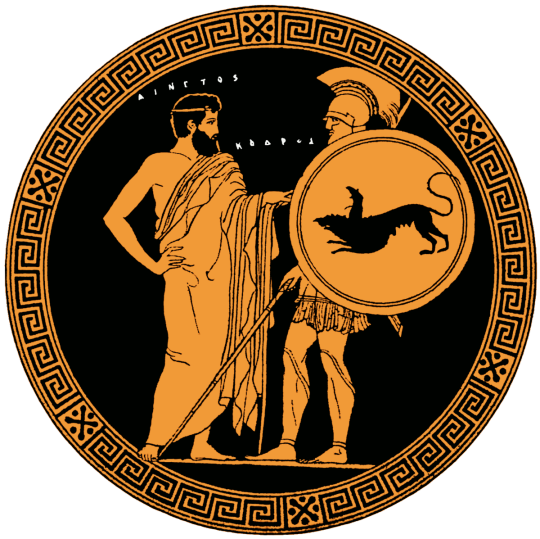
FIG. 43.-Codrus, going forth to his last battle, bids a friend farewell (Bolognacylix).
But meanwhile there were still kings at Athens. The Medontids had robbed the kings of their royal power, but they had not done away with the kings; there was to be a king at Athens till the latest days of the Athenian democracy. It seems probable that, as some historical analogies might suggest, the Medontids allowed the shadow of royalty to remain in the possession of the old royal house,so that for some time there would have been life-kings existing by the side of the life-regents; it is not likely that from the very first the kingship was degraded to be a yearly office, filled by electiton. This, however, was what it ultimately became.
The whole course of the constitutional development is uncertain; for it rests upon traditions, of which it is extremely hard to judge the value. But, whatever the details of the growth may have been, two important facts are to be grasped, One is that the fall royalty, which does not imply the abolition of the royal name, happened in Athens at an earlier period than in Greece generally. The other is that the Medontids were not kings, but archons ––the chiefs of an aristocracy. The great work of the Medontids wns the foundation of the Athenian commonwealth; and perhaps one of their house is to be remembered for another achievement, not less great, which has been already described, the union of Attiea.
That union need not be older than the ninth century, and it is possible that the same republican movement which led to the downfall of the old royal house of the Acropolis, led to the synoecism of Attica. The political union of a country demands a system of organisation; and the statesmen who united Attica sought their method of organisation from one of those cities of Ionia, which Athens came to look upon as her own daughters. All the inhabitants were distributed into four tribes, which were borrowed from Miletus. The curious names of these tribes––Geleontes, Argadeis, Aigicoreis, and Hoplētes––seem to have been derived from the worship of special deities; for instance, Geleontes from Zeus Geleon. But the original meanings of the names had entirely passed away, and the tribes were affiliated to Apollo Patrōos, the paternal Apollo, from whom all Athenians claimed descent. The Brotherhoods seem to have been reorganised and arranged under the tribes––three to each tribe; so that there were twelve brotherhoods in the Attic state. At the head of each tribe was a "tribe-king."
We can see the clan organisation at Athens better than elsewhere. The families of each clan derived themselves from a common ancestor, and most of the clan names are patronymics. The worship of this ancestor was the chief end of the society. All the clans alike worshipped Zeus Herkeios and Apollo Patrōos; many of them had a special connexion with other public cults. Each had a regular administration and officers, at the head of whom was an"archon." To these clans only members of the noble families belonged; but the other classes, the peasants and the craftsmen, formed similar organisations founded on the worship not of a common ancestor, for they could point to none, but some deity whom they chose. The members of these were called orgeōnes. This innovation heralds the advance of the lower classes to political importance.
The brotherhoods, composed of families whose lands adjoined, united their members in the cult of Zeus Phratrios and Athena Phratria. In early times only clansmen belonged to the brotherhoods, but here again a change takes place in the seventh century,and orgeones are admitted. The organisation was then used for the purposes of census. Every child whose parents were citizens must be admitted into a brotherhood; and, if this rite is neglected, he is regarded as illegitimate. It should be observed that illegitimacy at Athens did not deprive a man of political rights, but he could not lay claim by right of birth to his father's inheritance.
At a much later time the constitutional historians of Athens made out that the clans were artificial subdivisions of the brotherhoods. They said that each tribe was divided into three brotherhoods, each brotherhood into thirty clans, and it was even added that each clan comprised thirty men. This artificial scheme is true, so far as the relation of the tribe to the brotherhood is concerned; but it is not true in regard to the clan, and is refuted by the circumstance that the tribes consisted of others than clansmen.
SECT. 3. THE ARISTOCRACY IN THE SEVENTH CENTURY
Early in the seventh century, then, the Athenian republic was an aristocracy, and the executive was in the hands of three annually elected officers, the archon, the king, and the polemarch. The archon was the supreme judge in all civil suits. When he entered on office, he published a declaration that he would, throughout the term of his archonship, preserve the property of every citizen intact, At a later time this sphere of judicial power was limited and he judged mainly cases in which injured parents, orphans, heiresses were involved, He held the chief place among the magistrates, having his official residence in the Prytaneum where was the public hearth, and his name appeared at the head of official lists, whence he was called epōnymus; though the archonship was a later institution than that of polemarch, as is shown by the fact that no old religious ceremonies were performed by the archon, such as devolved upon the polemarch as well as upon the king. But the conduct of festivals instituted at later times was enlisted to him. Such was the Thargelia, the late-May feast of the first-fruits, the chief Athenian feast of Apollo, introduced from Delos probably in the seventh century; such was the great Dyonisia, which, as we shall see, were founded in the sixth. The polemarch had judicial duties, besides being commander-in-chief of the army. He held a court in the Epilykeion on the banks of the Ilisus, and judged there all cases in which non-citizens were involved. Thus what the archon was for citizens, the polemarch was for class of foreign settlers who were called "metics." The king had his residence in the royal Stoa in the Agora. His functions were confined to the management of the state-religion, and the conduct of certain judicial cases connected with religion. He was president of the Council, and thus had considerable power and responsability in the conduct of the judicial functions of that body.
The Bulê or Council was the political organisation through which the nobles carried out, at Athens as elsewhere, the gradual abolition of monarchy. This Council of Elders––a part as we saw of the Aryan inheritance of the Greeks––came afterwards to be called at Athens the Council of the Areopagus, to distinguish it from other councils of later growth. This name was derived from one of the Council's most important functions. According to early custom, which we find reflected in Homer, murder and man-slaughter were not regarded as crimes against the state, but concerned exclusively the family of the slain man, which might either slay the slayer or accept a compensation. But gradually, as the worship of the souls of the dead and the deities of the underworld developed, the belief gained ground that he who shed blood was impure and needed cleansing. Accordingly when a murderer satisfied the kinsfolk of the murdered by paying a fine, he had also to submit to a process of purification, and satisfy the Chthonian gods and the Erinyes or Furies, who were, in the original conception, the souls of the dead clamouring for vengeance. This notion of manslaughter as a religious offence necessarily led to the interference of the state. For when the member of a community was impure, the stain drew down the anger of the gods upon the whole community, if the unclean were not driven out. Hence it came about that the state undertook the conduct of criminal justice. The Council itself formed the court, and the proceedings were closely associated with the worship of the Semnai. These Chthonian goddesses had a sanctuary, which served as a refuge for him whose hand was stained with bloodshed, on the north-east side of the Areopagus, outside the city wall. It is possible the the association of this hill with the god Ares is merely due to a popular etimology, for he had no shrine here; but the correct explanation of the name Areiospagos is not known. On this rugged spot, apart from but within sight of the dwellings of men, the Council held its sittings for cases of murder, violence with murderous intent, poisoning, and incendiarism, The accuser stood on the stone of Insolence, the accused on the stone of Recklessness, each a huge unhewn block.This function of the Council, which continued to belong to it after it had lost its other powers, procured it the name of Areopagus.
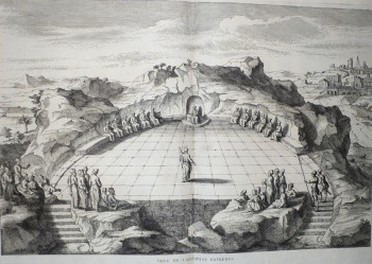
A sketch of what the Court of the Aeropagus is believed to have looked like.
During the period of the aristocracy, the Council was the governing body of Athens. We may be certain that the magistrates were always members; but otherwise we do not know how it was composed, and therefore can form no clear idea how the constitution worked. The Council doubtless exercised direct control over the election of the chief magistrates; but we need have small doubt that the king, the archon, and the polemarch were either elected by the Ecclesia consisting of the whole body of citizens entitled to vote, or at all events were chosen by the Council out of a limited number nominated by the Assembly.
As an achievement of the aristocracy we may regard the annexation of Eleusis. The Eleusinian kingdom bound in by Athens on one side and Megara on the other––its little bay locked by Megarian Salamis––did not play any part in any portion of Greek history of which we have the faintest record. But of its independent existence we have a clear echo in a hymn which tells the Eleusinian story of Demeter. That goddess, wandering in quest of her lost daughter Persephone, came to Eleusis, where she was hospitably entertained by the king, and would have made his infant son immortal but for the queen's want of faith. This poem is thought to have been composed in the seventh century, and, if so, the days when Eleusis was independent had not yet passed out of men's memories then.
The middle of the seventh century is marked by a further constitutional change, which is the result of various social changes.The aristocracy of birth is forced to widen into an aristocracy of wealth, The general causes of this change are to be found in the new economical conditions which have been already pointed out as affecting the whole Greek world in the seventh century. But to understand their operation and political consequences at Athens,we must look more closely into the classes of the Attic population and the social structure.
Under the rule of the kings and the aristocracies, the free population fell into three classes: the Eupatridae or nobles; " the Georgi or peasants who cultivated their own farms; and the Demiurgi (public workers), those who lived by trade or commerce. The Eupatrids originally lived in the country, and many Attic places were called from their families, such as Paeonidae or Butadae. After the synoecism, many of them came to live in the city. The Demiurgi had their settlements in the neighbourhood of the city––for example, there was the quarter of the "potters" north of the Areopagus––and also villages in the country, such as Pelekes or Daedalidae. But besides these classes of citizens, who had the right of attending the Assembly, there was a mass of freemen who were not citizens. Among these we can distinguish the agricultural labourers, who, having no land of their own, cultivated the estates of the nobles. In return for their labour they retained one-sixth of the produce and were hence called "Sixth-parters" (Hektemoroi).There were also the craftsmen who were employed and paid by the Demiurgi, and doubtless small retail dealers and others.
Although Attica seems to have taken no part in the colonising movements of the eighth and seventh centuries, the Athenians shared in the trading activities of the period and were profoundly affected by the economical revolution in the Greek world. The cultivation of the olive was becoming a feature of Attica, and its oil a profitable article of exportation. At the same time Attic potters were actively developing their industry on lines of their own, and Attic pottery was in the course of another century to become disseminated throughout the Mediterranean countries from Tuscany to Cyprus. Jars of this age have been found in tombs near the Dipylon gate on the north-west side of Athens, and these Dipylon vases, as they are called, give us a glimpse of the Attic civilisation of the period. We not only see a new style of vase-painting,with geometrical ornament and a symmetrical arrangement of the space at the painter's disposal; but in the pictures of funeral processions we can observe with what pomp and cost the Attic nobles buried their dead. In the graves where these vases were found, offerings were laid beside the dead, pottery and sometimes gold ornaments; and the sepulchral pit was surmounted not by a mound but by a tall clay jar with an opening below, through which drink offerings could be poured. But it must be noticed that soon after this epoch, the influence of Ionia made itself felt in Attica, and the custom was introduced of burning the dead; burial, however, was not discontinued; the two customs subsisted side by side. Ionia also influenced Athenian dress. The woollen peplos fastened with a pin was given up and the Ionian sleeved tunic or chiton, of linen, took its place.
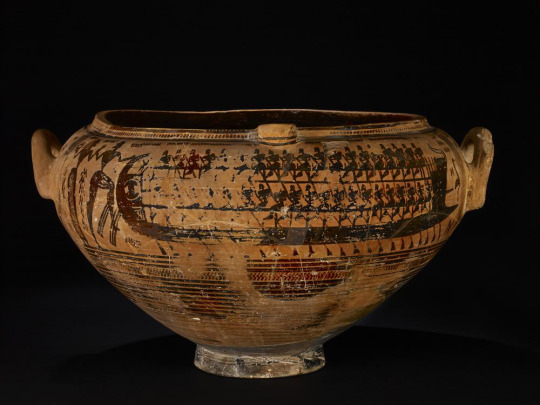
Dipylon Vase, with ship (British museum)
It would be interesting if we might see in the rude representations of ships on some of the Dipylon vases an illustration of the beginnings of Attic seamanship. The sea traffic of Athens must have been rapidly growing in the first half of the seventh century. It is easy to see how the active participation of Athens in trade began to undermine the foundations of the aristocracy of birth, by introducing a new standard of social distinction. The nobles engaged in mercantile ventures with various success, some becoming richer, and others poorer; and the industrial folk increased in wealth and importance. The result would ultimately be that wealth would assert itself as well as birth, both socially and politically; and in the second half of the seventh century we find that, though the aristocracy has not been fully replaced by a timocracy, or constitution, in which political rights depend entirely on wealth, all the conditions are present for such a transformation, For we find the people divided into three classes according to their wealth. The principle of division was the annual yield of landed property, in corn, oil, or wine. The highest class was the Pentacosiomedimni. Before this name had any official meaning it was perhaps in popular use to designate those large proprietors whose income reached five hundred medimni of corn, at a time when oil and wine had not been much cultivated. When it acquired an official sense, it was defined to include those whose land produced at least so many measures (medimni) of corn and so many measures (metrētae) of oil or wine as together amounted to five hundred measures. The second class included those whose property produced more than three hundred but less than five hundred such measures. These were called Knights, and so represented roughly those who could maintain a horse and take their part in war as mounted soldiers. The minimum income of the third class was two hundred measures, and their name, Teamsters, shows that they were well-to-do peasants who could till their land with a pair of oxen. The chief magistracies of archon, king, and polemarch were confined to the first class, but the principle was admitted that a successful man, although not a Eupatrid, was eligible for the highest offices if his income amounted to 500 midemni, It was natural that the rating should be expressed in terms of wealth derived from land; but it is not a necessary inference that the handicraftsmen were entirely excluded, or that in order to win political rights they were forced to purchase estates.
At first this concession of the Eupatrids to their fellow-citizens did not practically amount to much. Most of the richest men in the state still belonged to the old clans; but the recognition of wealth as a political test could not fail to undermine ultimately the privileges of birth. The organisation of the lower classes into bodies resembling the Clans of the nobles, and their admission into the Brotherhoods, have been mentioned. It is probable that the institution of the Thesmothetae also marks a step in the self-assertion of these classes. The Thesmothetae were a college of six judges, who managed the whole judicial system of Athens. It was their duty to examine, and call attention to defects in, the laws, and to keep a record of judicial decisions; and they seem to have taken cognisance of all cases which belonged to the scope of the Council of Areopagus, except trials for murder. In fact, it looks as if they were practically a committee of that Council. They were elected annually, and it has been plausibly supposed that the number of six was determined by the fact that they originated in a compromise between the orders, three being Eupatrids, two Georgi, and one a Demiurgos. They were soon associated with the three chief magistrates, the archon, basileus, and polemarch; and the nine came to form a sort of college and were called the Nine Archons, Each of the Nine when he entered on his office took an oath that he would act in accordance with the laws, and vowed that if he committed any injustice he would dedicate in gold a man's statue of life-size. It was a penalty which no archon could have discharged.
Outside these classes were the smaller peasants who had land of their own, of which, however, the produce did not amount to two hundred measures of corn or oil, and the humbler handicraftsmen.These were called Thêtes, the name being perverted from its proper meaning of "labourers." The Thêtes were citizens, but had no political rights. Yet they were beginning to win a certain public importance. The conditions of a growing maritime trade led to the development of a navy. As the sea power grew, a new organisation was found necessary, and there can be little doubt that the duty of serving as marines in the penteconters mainly devolved upon the Thêtes, This gave them a new significance in the state, a significance which would strengthen their claim to political rights when the time for pressing that claim should come. We shall see hereafter how closely connected was the democracy of Athens with her sea power; and we can hardly be wrong in surmising the faint foreshadowings of that connexion at the very beginning of her naval history. Each of the four tribes was divided, for this purpose, into twelve districts called Naucrariae; each naucraria was probably bound to supply a ship. Thus the fleet consisted of forty-eight ships. The administration was directed by a body of naucrari, at the head of which were presidents; and the organisation might be found convenient for other than naval purposes. Thus the naucrari formed an important administrative council.
We see then that, in the middle of the seventh century, society in Attica is undergoing the change which is transforming the face of all the progressive parts of Hellas; wealth is competing with descent as a political test; and the aristocracy of birth seems to be passing into a timocracy. The power is in the hands of the three chief archons, who always belong to the class of wealthy nobles, and the Council of Areopagus, which is certainly composed of Eupatridae. But the classes outside the noble Clans, the smaller proprietors and the merchants, are beginning to assert themselves and make their weight felt; possibly the institution of the thesmothetae is due to their pressure. They also obtain admission into the Brotherhoods, which had been hitherto exclusive, Attic trade is rapidly growing. The commercial development promotes these democratic tendencies, and has also led to the creation of a fleet, which, since the poorest class of citizens are required to man it, renders that class important and prepares the way for its political recognition.
As yet, however, the naval establishment of Athens was but small compared with her neighbours Chalcis and Corinth, or her daughter cities of Ionia. And Aegina, which had come for a while under the influence of Argos, outstripped her. It is interesting to find these two cities, Athens and Aegina, which were in later times to be bitter rivals for the supremacy in their gulf, in the seventh century taking part in an association for maintaining the worship of Poseidon in the little island of Calauria, over against Troezen. Other coast towns of the Saronic and Argolic bays––Epidaurus, Troezen, Hermione, Nauplia, Prasiae––belonged to this sacred union; and the Boeotian Orchomenus, by virtue of the authority which she still possessed over the sailors of Anthedon, was also a member. There was no political significance in the joint Calaurian worship of these maritime towns; their seamen propitiated Poseidon at Calauria, just as they sacrificed to Panhellenic Zeus on the far-seen Mountain of Aegina. And they were not grudging votaries.They built a house for the sea-god in his island; its foundations have been recently uncovered, and it is one of the earliest stone temples whose ruins have been found in Greece.
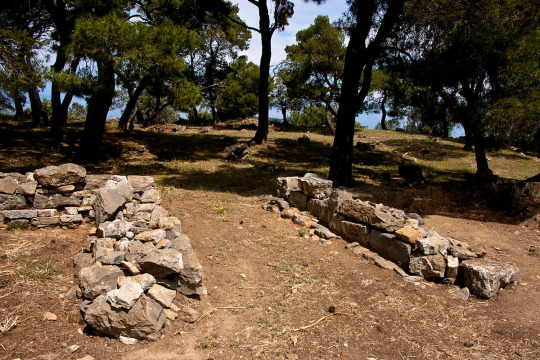
Restos del templo de Poseidón de Calauria.
Attica, like the rest of the Greek world, was disturbed in her economic development by the invention of money. She had naturally been brought into close commercial relations with her neighbour Aegina, which at this time began to take a leading part in maritime enterprise. Accordingly we find Athens adopting the Aeginetan coinage, and using a system of weights and measures which was almost, if not quite, identical with the Aeginetan. The introduction of money, which was at first very scarce, and led to the accumulation of capital in the chests of successful speculators, was followed by a period of transition between the old system of the direct exchange of commodities and the new system of a metallic medium; and this transitional period was trying to all men of small means. But the inevitable economic crisis did not come at once, though all conditions of social distress were present, and a conflict between the rich and the poor was drawing steadily near. An event happened about thirty years before the end of the century which shows that the peasants were still loyal to the existing constitution.
The example of tyranny was infectious, and, as it flourished at the very door of Athens––in Megara and Corinth,––it was unlikely that some attempt should not be made at Athens too. A certain Cylon, of noble family, married the daughter of Theagenes, tyrant of Megara; and, under Megarian influence and with Megarian help, he tried to make himself master of the city. Consulting the Delphic oracle, he was advised to seize the Acropolis on the greatest festival of Zeus. Cylon, an Olympic victor himself, had no doubt that the feast of Olympia was meant; but when his plot failed, it was explained that the oracle referred to the Athenian feast of the Diasia in March, which was celebrated outside the city. Cylon enlisted in his enterprise a number of noble youths, and a band of Megarian soldiers were sent by Theagenes; he had no support among the people. He succeeded in seizing the Acropolis, but the sight of foreign soldiers effectually quenched any lurking sympathy that any of the Athenians might have felt for an effort to overthrow the government. The Council of the naucraries summoned the husbandmen from the country, and the summons was readily obeyed. Cylon was blockaded in the citadel, and, after a long siege when food and water began to fail, he escaped with his brother from the fortress. The rest were soon constrained to capitulate. They sought refuge in the temple of Athena Polias, and left it when the archons promised to spare their lives. But Megacles, of the Alcmaeonid family, was archon this year; and at his instigation the pledge was disregarded, and the conspirators were put to death. Some feud among the clans may have been at work here. The city was saved from a tyrant, but it had incurred a grave pollution. Such a violation of a solemn pledge to the suppliants who had trusted in the protection of the gods was an insult to the gods themselves; and the city was under a curse till the pollution should be removed. This view was urged by the secret friends of Cylon and those who hated the Alcmaeonids. And so it came to pass that while Cylon, his brother, and their descendants were condemned to disfranchisement and perpetual banishment, the Alcmaeonids and those who had acted with them were also tried on the charge of sacrilege and condemned to a perpetual exile, with confiscation of their property.And the bodies of those of the clan who had died between the deed of sacrilege and the passing of this sentence were exhumed and cast beyond the boundary of Attica. The banishment of the Alcmaeonids had consequences in the distant future, and we shall see how it comes into the practical politics of Athens two hundred years later. The tale is also told that the city required a further purification, and that a priest named Epimenides came from Crete and cleansed it. But it has been thought doubtful whether Epimenides is more than a mythical name like Orpheus, since another story brings him to Athens again, for similar purposes of atonement, more than a century afterwards; and then both tales are conciliated by ascribing to the seer a miraculous sleep of a hundred years.
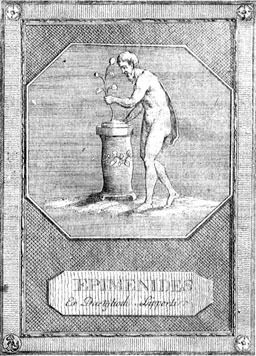
Epimenides of Cnossos
In the course of the next ten years, the state of the peasants seems to have changed considerably for the worse. The outbreak of a war with Megara, in consequence of the plot of Cylon, aggravated the distress of the rural population; for the Attic coasts suffered from the depredations of the enemy, and the Megarian market was closed to the oil-trade. Whether the peasants, who groaned under the existing system, found leaders and extorted concessions from the government, or whether the ruling classes themselves saw the danger, and tried to prevent it by a timely concession, it was at all events decided that a code of law should be drawn up and written down. Probably men had been clamouring long to obtain this security for life and property; and what the thesmothetae may have already done by recording judicial decisions in writing was not enough. Dracon was appointed an extraordinary legislator (Thesmothetes), and empowered to codify and rectify the existing law. We know only the provisions of that part of his criminal law which dealt with the shedding of blood; for these provisions were not altered by subsequent legislation. In later times it was thought that Dracon revealed to the Athenians how harsh their laws were, and his name became proverbial for a severe lawgiver. An Athenian orator won credit for his epigram that Dracon's laws were written not in ink but in blood. This idea arose from the fact that certain small offences, such as stealing cabbage,were punished by death. A broader view, however, of Dracon's code will modify this view. He drew careful distinctions between murder and various kinds of accidental or justifiable manslaughter. In Dracon's laws we meet a body of fifty-one judges, called the Ephetae. They were chosen from the Eupatrids, but it is not clear whether they formed a part of the Council of the Areopagus or were a wholly distinct body. Those cases of bloodshed which did not come before the court of the Areopagus were tried by the Ephetae, in case the shedder of blood was known. According to the nature of the deed the Ephetae held their court in different places: in the temple of the Delphinian Apollo, in the Palladion at Phaleron, or at Phreatto, a tongue of land on the Munychian peninsula. This last court was used in the case of those who were tried for manslaughter committed abroad, and as they might not set foot on the soil of their country, they had to answer the charge standing in a boat drawn up near the shore. When the shedder of blood was not known, the case came before the King in the Prytaneum.
It is unfortunate that we are not informed of Dracon's other legislation. We know that the laws relating to debtors were stringent; the creditor could claim the person of the insolvent debtor. In general, he was bound to provide for the interests of the rich power-holding class; but it was at all events an enormous gain for the poor that those interests should be defined in writing.
SECT. 4. THE LEGISLATION OF SOLON AND THE FOUNDATIONOr DEMOCRACY
Dracon's code was something, but it did not touch the root of the evil. Every year the oppressiveness of the rich few and the impoverishment of the small farmer were increasing. Without capital, and obliged to borrow money, the small proprietors mortgaged their lands, which fell into the hands of capitalists, who lent money at ruinous interest. It must be remembered that money was still very scarce, and that the peasants had now to purchase all their needs in coin. Even in Attica the small peasant could not cope with the larger proprietor. Thus the little farms of Attica were covered with stones, on which the mortgage bonds were written; the large estates grew apace; the black earth, as Solon said, was enslaved.
The condition of the free labourers was even more deplorable. The sixth part of the produce, which was their wage, no longer suficed, under the new economical conditions, to support life, and they were forced into borrowing from their masters. The interest was high, the laws of debt were ruthless, and the person of the borrower was the pledge of repayment and forfeited to the lender in case of inability to pay. The result was that the class of free labourers was being gradually transformed into a class of slaves, whom their lords could sell when they chose.
Thus while the wealthy few were becoming wealthier and greedier, the small proprietors were becoming landless, and the landless freemen were becoming slaves. And the evil was aggravated by unjust judgments, and the perversion of law in favour of the rich and powerful. The social disease seemed likely to culminate in a political revolution. The people were bitter against their remorseless oppressors, and only wanted a leader to rebel. To any student of contemporary politics, observing the development in other states, a tyranny would have seemed the most probable solution. A tyranny had already, once at least, and probably more than once, been averted; and now, as it happened, the masses obtained a mediator, not a demagogue, a reform, not a revolution. The tyranny, though it was ultimately to come, was postponed for more than thirty years. The mediator in the civil strife was Solon, the son of Execestides, a noble connected with the house of the Medontids, He was a merchant, and belonged to the wealthiest class in the state. But he was very different from the Attic Eupatrids, rustic squires, of old fashions and narrow vision. We may guess that he had not been a home-keeping youth, but had visited the eastern coasts of the Aegean, whither mercantile concerns might have taken him. At all events, he had learned much from progressive Ionia. He had imbued himself with Ionic literature, and had mastered the art of writing verse in the Ionic idiom; so that he could himself take part in the intellectual movement of the day and become one of the sages of Greece. He was a poet, not because he was poetically inspired, like the Parian Archilochus of an earlier, or the Lesbian Sappho of his own, generation; but because at that time every man of letters was a poet; there was no prose literature. A hundred years later Solon would have used prose as the vehicle of his thoughts. His moderate temper made him generally popular; his knowledge gave him authority; and his countrymen called upon him, at last, to set their house in order, We are fortunate enough to possess portions of poems––political pamphlets––which he published for the purpose of guiding public opinion; and thus we have his view of the situation in his own words. He did not scruple to speak plainly.The social abuses and the sad state of the masses were clear to everybody, but Solon saw another side of the question; and he had no sympathy with the extreme revolutionary agitators who demanded a redistribution of lands. The more moderate of the nobles seem to have seen the danger and the urgent need of a new order of things; and thus it came to pass that Solon was solicited to undertake the work of reform. He definitely undertook the task and was elected archon, with extraordinary legislative powers, for the purpose of healing the evils of the state, and conciliating the classes.
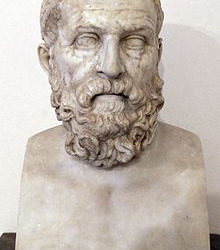
Bust of Solon, copy from a Greek original (c. 110 BC) from the Farnese Collection, now at the National Archaeological Museum, Naples
Instead of making the usual declaration of the chief magistrate,that he would protect the property of all men undiminished, he made proclamation that all mortgages and debts by which the debtor's person was pledged were annulled, and that all those who had become slaves for debt were free. By this proclamation in that summer, memorable for the rescue of hundreds of poor wretches into liberty and hope, the Athenians "shook off their burdens," and this first act of Solon's social reform was called the Seisachtheia. The great deliverance was celebrated by a public feast.
The character of the remedial measures of Solon is imperfectly known. After the cancelling of old debts he passed a law which forbade debtors to be enslaved. He fixed a limit for the measure of land which could be owned by a single person, so as to prevent the growth of dangerously large estates. And he forbade the exportation of Attic products, except oil. For it had been found that so much corn was carried to foreign markets, where the prices were higher, that an insufficient supply remained for the population of Attica. It is to be observed that at this time the Athenians had not yet begun to import Pontic corn.
All these measures hit the rich hard, and created discontent with the reformer; while, on the other hand, he was far from satisfying the desires and hopes of the masses. He would not confiscate and redistribute the estates of the wealthy, as many wished. And, though he rescued the tree labourer from bondage, he made no change in the Sixth-part system, so that the condition of these landless freemen was improved only in so far as they could not be enslaved, and in so far as the law limiting exportation affected prices. And Solon was too discreet to attempt to interfere seriously with the conditions of the money market by artificial restrictions. He fixed no maximum rate of interest, and his monetary reforms must be kept strictly apart from his social reforms. Hitherto the Athenians did not coin money of their own. They used the Aeginetan currency. Solon inaugurated a native coinage, but he adopted the Euboic, not the Aeginetan, standard. Thus I00 of the new Attic drachmae were equivalent in value to about 70 Aeginetan drachmae. The Attic coinage introduced by Solon is to be brought into connexion, not with the domestic reform, but with the foreign policy of Athens, to which new prospects were opening. The old coinage attached her to Aegina, with which her relations were strained, and to her foe Megara; the new system seemed to invite her into the distant fields beyond the sea, where Chalcis and Corinth had led the way in opening up a new world. A generation later, a new monetary reform introduced a distinct Attic standard, slightly higher than the Euboic.
What Solon did to heal the social sores of his country entitled him to the most fervent gratitude, but it was no more than might have been done by any able and honest statesman who possessed men's confidence. His title to fame as one of the great statesmen of Europe rests upon his reform of the constitution. He discovered a secret of democracy, and he used his discovery to build up the constitution on democratic foundations. The Athenian common-wealth did not actually become a democracy till many years later; but Solon not only laid the foundations, he shaped the framework. At first sight, indeed, the state as he reformed it might seem little more than an aristocracy of wealth––a timocracy––with certain democratic tendencies. He retained the old graduation of the people in classes according to property. But he added the Thêtes as a fourth class, and gave it certain political rights. On the three higher classes devolved the public burdens, and they served as cavalry or as hoplites. The Thetes were employed as light-armed troops or as marines. It is probable that Solon made little or no change in regard to the offices which were open to each class. Pentacosio-medimni were alone eligible to the archonship, and for them alone was reserved the financial office of Treasurer of Athena. Other offices were open to the Hippês and the Zeugitae, but the distinction in privilege between them is unknown. The Thetes were not eligible to any of the offices of state, but they were admitted to take part in the meetings of the Ecclesia, and this gave them a voice in the election of the magistrates.
The opening of the Assembly to the lowest class was indeed an important step in the democratic direction; but it may have been only the end of a gradual process of widening, which had been going on under the aristocracy. The radical measure of Solon, which was the very corner-stone of the Athenian democracy, was his constitution of the courts of justice. He constituted a court out of all the citizens, including the Thetes; and as the panels of judges were enrolled by lot, the poorest burgher might have his turn. Any magistrate on laying down his office could be accused before the people in these courts; and thus the institution of popular courts invested the people with a supreme control over the administration. The people, sitting in sections as sworn judges,were called the Heliaea, ––as distinguished from the Ecclesia, in which they gathered to pass laws or choose magistrates, but were required to take no oath. Having in its hands both the appointment of the magistrates and the control possessed theoretically the sovereignty of the state; and the meting out of more privileges to the less wealthy classes could be merely a matter of time. At first the archons were not deprived of their judicial powers, and the heliaea acted as a court of appeal; but by degrees the competence of the archons was reduced to the conduct of the proceedings preliminary to a trial, and the heliaea became both the first and the final court.
The constitution of the judicial courts out of the whole people was the secret of democracy which Solon discovered. It is his title to fame in the history of the growth of popular government in Europe. Without ignoring the tendencies to a democratic development which existed before him, and without, on the other hand, disguising the privileges which he reserved to the upper classes, we can hardly hesitate to regard Solon as the founder of the Athenian democracy. It must indeed be confessed that there is much in the scope and intention of his constitution which it is difficult to appreciate, because we know so little of the older constitution which he reformed. Thus we have no definite record touching the composition of the Council of the Areopagus, touching its functions as a deliberative body and its relations to the Assembly, or touching the composition of the Assembly itself. We can, however, have little doubt that under the older commonwealth the Council of Elders exerted a preponderant influence over the Assembly, and that the business submitted to the Assembly, whether by the magistrates or in whatever way introduced, was previously discussed and settled by the Council. The founder of popular government could not leave this hinge of the aristocratic republic as it was. He must either totally change the character of the Council and transform it into a popular body, or he must deprive it of its deliberative functions in regard to the Assembly. Solon deprived the Council of Elders of these deliberative functions, so that it could no longer take any direct part in administration and legislation. But on the other hand he assigned to it a new and lofty rôle. He constituted it the protector of the constitution, and the guardian of the laws, giving it wide and undefined powers of control over the magistrates, and a censorial authority over the citizens. Its judicial and religious functions it retained. In order to bring it into harmony with the rest of his constitution, Solon seems to have altered the composition of the Council. Henceforward, at least, the nine archons at the end of their year of office became life-members of the Council of the Areopagus; and this was the manner in which the Council was recruited. Thus the Areopagites were virtually appointed by the people in the Assembly.
Having removed the Council of the Areopagus to this place of dignity, above and almost outside the constitution, Solon was obliged to create a new body to prepare the business for the Assembly. Such a body was indispensable, as the Greeks always recognised; and it is clear that in its absence enormous powers would have been placed in the hands of the magistrates, on whom the manipulation of the Assembly would have entirely devolved. The "probuleutic"Council which Solon instituted consisted of four hundred members; a hundred being taken from each of the four tribes, either chosen by the tribe itself or, more probably, picked by lot. All citizens of the three higher classes were eligible; the Thetes alone were excluded. In later days this Council––or rather a new Council which took its place––gained a large number of important powers, which made it to all intents an independent body in the state, but at first its functions seem to have been purely "probuleutic," and it has therefor rather the aspect of being merely a part of the organisation of the Assembly. It must always be remembered that it does not represent the Council of Elders of the Aryan foreworld; it does not correspond to the Gerusia of Sparta or the Senate of Rome. But it takes over certain functions which had before formed part of the duty of the Council of elders; it discusses beforehand the public matters which are to be submitted to the Assembly.
The use of lot for the purpose of appointing public officers was a feature of Solon's reforms, According to men's ideas in those days, lot committed the decision to the gods, and was thus a serious method of precedure––not a sign of political levity, as we should regard it now. But a device which superstition suggested was approved by the reflexions of philosophical statesmen; and lot was recognised as a valuable political engine for security against undue influence and for the protection of minorities. It was doubtless as a security against the undue influence of clans and parties that Solon used it. He applied it to the appointment of the chief magistrates themselves. But, religious though he was, he could not be blind to the danger of taking no human precautions against the falling of the lot upon an incompetent candidate. He therefore mixed the two devices of lot and election. Forty candidates were elected, ten from each tribe, by the voice of their tribesmen; and out of these the nine archons were picked by lot. It is probable that a similar mixed method was employed in the choice of the Four Hundred Councillors.
Solon sought to keep the political balance steady by securing that each of the four tribes should have an equal share in the government. He could hardly have done otherwise, and yet here we touch on the weak point in the fabric of his constitution. The gravest danger ahead was in truth not the strife of poor and rich, of noble lord and man of the people, but the deep-rooted and bitter jealousies which existed between many of the clans, While the clan had the tribe behind it and the tribe possessed political weight, such feuds might at any moment cause a civil war or a revolution. But it was reserved for a future lawgiver to grapple with this problem. Solon assuredly saw it, but he had no solution ready to hand; and the evil was closely connected with another evil, the local parties which divided Attica. For these dangers Solon offered no remedy, and therefore his work, though abiding in the highest sense, did not supply a final or even a brief pacification of the warring elements in the state. He is said to have passed a law––so clumsy, so difficult to render effective, that it is hard to believe that such an enactment was ever made––that in the case of a party struggle every burgher must take a side under pain of losing his civic rights. Solon, if he was indeed the author of such a measure, sought to avert the possible issues of political strife by forcing the best citizens to intervene; it was a safeguard, a clumsy safeguard, against the danger of a tyranny.
It is interesting to observe that in some directions Solon extended and in others restricted the freedom of the individual. He restricted it by sumptuary laws and severe penalties for idleness; he extended it by an enactment allowing a man who had no heirs of his body to will his property as he liked, instead of its going to the next of kin.12 One of Solon's first acts was to repeal all the legislation of Dracon, except the laws relating to manslaughter. His own laws were inscribed on wooden tables set in revolving frames called axǒnes, which were numbered, and the laws were quoted by the number of the axon. These tablets were kept in the Public hall, But copies were made on stone pillars, called in the old Attic tongue kyrbeis, and kept in the Portico of the King. Every citizen was required to take an oath that he would obey these laws; and it was ordered that the laws were to remain in force for a hundred years.
Solon had done his work boldly, but he had done it constitutionally. He had not made himself a tyrant, as he might easily have done, and as many expected him to do. On the contrary, one purpose of his reform was to forestall the necessity, and prevent the possibility, of a tyranny. He had not even become an aesymnetes––a legislator (like Pittacus) who for a number of years supersedes the constitution in order to reform it, and rules for that time with the absolute power of a tyrant. He had simply held the office of archon, invested, indeed, with extraordinary powers. To a superficial observer caution seemed the note of his reforms, and men were surprised, and many disgusted, by his cautiousness. His caution consisted in reserving the highest offices for men of property, and the truth probably is that in his time no others would have been fitted to perform the duties. But Solon has stated his own principle that the privileges of each class should be proportional to the public burdens which it can bear. This was the conservative feature of his legislation; and, seizing on it, democrats could make out a plausible case for regarding his constitution as simply a timocracy. When he laid down his office he was assailed by complaints, and he wrote elegies in which he explains his middle course and professes that he performed the things which he undertook without favour or fear. "I threw my stout shield," he says, "over both parties." He refused to entertain the idea of any modifications in his measures, and thinking that the reforms would work better in the absence of the reformer, he left Athens soon after his archonship and travelled for ten years, partly for mercantile ends, but perhaps chiefly from curiosity, to see strange places and strange men.
Though the remnants of his poems are fragmentary, though the recorded events of his life are meagre, and though the details of his legislation are dimly known and variously interpreted, the personality of Solon leaves a distinct impression on our minds. We know enough to see in him an embodiment of the ideal of intellectual and moral excellence of the early Greeks, and the greatest of their wise men. For him the first of the virtues was moderation, and his motto was "Avoid excess." He was in no vulgar sense a man of the world, for he was many-sided––poet and legislator, traveller and trader, noble and friend of the people. He had the insight to discern some of the yet undeveloped tendencies of the age, and could sympathise with other than the power-holding classes. He had meditated too deeply on the circumstances of humanity to find power a temptation; he never forgot that he was a traveller between life and death. It was a promising and characteristic act for a Greek state to commit the task of its reformation to such a man, and empower him to translate into definite legislative measures the views which he expressed in his poems.
Solon's social reforms inaugurated a permanent improvement. But his political measures, which he intended as a compromise, displeased many. Party strife broke out again bitterly soon after his archonship, and only to end, after thirty years, in the tyranny which It had been his dearest object to prevent. Of this strife we know little. It took the form of a struggle for the archonship, and two years are noted in which, in consequence of this struggle, no archons were elected, hence called years of anarchy, Then a certain archon, Damasias, attempted to convert his office into a permanent tyranny and actually held it for over two years. This attempt frightened the political parties into making a compromise of some sort. It was agreed that ten archons should be chosen, five Eupatrids, three Georgi, and two Demiurgi, all of course possessing the requisite minimum of wealth. It is unknown whether this arrangement was repeated after the year of its first trial, but it certainly did not lead to a permanent reconciliation.
The two great parties were those who were in the main satisfied with the new constitution of Solon, and those who disliked its democratic side and desired to return to the aristocratic government which he had subverted. The latter consisted chiefly of Eupatrids and were known as the men of the Plain. They were led by Lycurgus, and numbered among them the clan of the Philaidae––distinguished as the clan of Hippoclides, the wooer of Agarista, and destined to become more distinguished still as that of more than one Cimon and Miltiades. The opposite party of the Coast included not only the population of the coast, but the bulk of the middle classes, the peasants as well as the demiurgi, who were bettered by the changes of Solon. They were led by Megacles, son of Alcmaeon, the same Megacles who married Agarista. For one of Solon's measures was an act of amnesty which was couched in such terms that, while it did not benefit the descendants of Cylon, it permitted the return of the Alcmaeonidae. Their position severed them from the rest of the Eupatrids and associated them with the party which represented Solon's views.
— John Bagnell Bury
Obtenido de “A History of Greece to the death of Alexander the Great“. pps. 155-181
#Theseus#Codrus#Acastus#Cylon#Epimenides#Theagenes#Megacles#Dracon#Solon#Excesestides#Archilochus#Pittacus#Damasias#Lycurgus#hippoclides#cimo frankel#Miltiades#Alcmeon#Agarista
3 notes
·
View notes
Text
What does the Bible say about reincarnation?
The whole thrust of the Bible opposes reincarnation. It shows that man is the special creation of God, created in God’s image with both a material body and an immaterial soul and spirit. He is presented as distinct and unique from all other creatures—angels and the animal kingdom alike. The Bible teaches that at death, while man’s body is mortal, decays and returns to dust, his soul and spirit continue on either in a place of torments for those who reject Christ or in paradise (heaven) in God’s presence for those who have trusted in the Savior. Both categories of people will be resurrected, one to eternal judgment and the other to eternal life with a glorified body (John 5:25-29). The emphatic statement of the Bible, as will be pointed out below, is that “it is appointed unto men once to die and after that the judgment” (Heb. 9:27). This statement and the concept that mankind’s creation in God’s image is unique from the animals and even angels stand totally opposed to the idea of reincarnation—dying and coming back as another person or in the form of an animal or insect. The claim of some that they have information of past history is nothing more than some kind of encounter with demonic powers who have been present throughout history.
Below is information from A Handbook of Christian Apologetics by Peter Kreeft and Ronald Tacelli. (InterVarsity Press, Downers Grove).
Six Basic Theories
The human race has come up with six basic theories about what happens to us when we die.
1. Materialism: Nothing survives. Death ends all of me. Seldom held before the eighteenth century, materialism is now a strong minority view in industrialized nations. It is the natural accompaniment of atheism.
2. Paganism: A vague, shadowy semiself or ghost survives and goes to the place of the dead, the dark, gloomy Underworld. This is the standard pagan belief. Traces of it can be found even in the Old Testament Jewish notion of sheol. The “ghost” that survives is less alive, less substantial, less real than the flesh and blood organism now living. It is something like a “ghost image” on a TV set: a pale copy of the lost original.
3. Reincarnation: The individual soul survives and is reincarnated into another body. Reincarnation is usually connected with the next belief, pantheism, by the notion of karma: that after the soul has fulfilled its destiny, and learned its lessons and become sufficiently enlightened, it reverts to a divine status or is absorbed into (or realizes its timeless identity with) the divine All.
4. Pantheism: Death changes nothing, for what survives death is the same as what was real before death: only the one, changeless, eternal, perfect, spiritual, divine, all-inclusive Reality, sometimes called by a name (“Brahman”) and sometimes not (as in Buddhism). In this view—that of Eastern mysticism—all separateness, including time, is an illusion. Therefore, in this view, the very question of what happens after death is mistaken. The question is not solved but dissolved.
5. Immortality: The individual soul survives death, but not the body. This soul eventually reaches its eternal destiny of heaven or hell, perhaps through intermediate stages, perhaps through reincarnation. But what survives is an individual, bodiless spirit. This is Platonism, often confused with Christianity.
6. Resurrection: At death, the soul separates from the body and is reunited at the end of the world to its new, immortal, resurrected body by a divine miracle. This is the Christian view. This view, the supernatural resurrection of the body rather than the natural immortality of the soul alone, is the only version of life after death in Scripture. It is dimly prophesied and hoped for in the Old Testament, but clearly revealed in the New.
For both (5) and (6), the individual soul survives bodily death. That is the issue we shall argue here. We do not take the time to argue against paganism (2) or reincarnation (3) or pantheism (4) here, but only against modern materialism (1), since that is the source of most of the philosophical arguments against immortality in our culture.
Ten Refutations of Reincarnation
Christianity rejects reincarnation for ten reasons.
1. It is contradicted by Scripture (Heb 9:27).
2. It is contradicted by orthodox tradition in all churches.
3. It would reduce the Incarnation (referring to Christ’s incarnation) to a mere appearance, the crucifixion to an accident, and Christ to one among many philosophers or avatars. It would also confuse what Christ did with what creatures do: incarnation with reincarnation.
4. It implies that God made a mistake in designing our souls to live in bodies, that we are really pure spirits in prison or angels in costume.
5. It is contradicted by psychology and common sense, for its view of souls as imprisoned in alien bodies denies the natural psychosomatic unity.
6. It entails a very low view of the body, as a prison, a punishment.
7. It usually blames sin on the body and the body’s power to confuse and darken the mind. This is passing the buck from soul to body, as well as from will to mind, and a confusion of sin with ignorance.
8. The idea that we are reincarnated in order to learn lessons we failed to learn in a past earthly life is contrary to both common sense and basic educational psychology. I cannot learn something if there is no continuity of memory. I can learn from my mistakes only if I remember them. People do not usually remember these past “reincarnations.”
9. The supposed evidence for reincarnation, rememberings from past lives that come out under hypnosis or “past life regression” can be explained—if they truly occur at all—as mental telepathy from other living beings, from the souls of dead humans in purgatory or hell, or from demons. The real possibility of the latter should make us extremely skittish about opening our souls to “past life regressions.”
Please Note: While I would agree with the demonic aspect, I do not agree with the idea of purgatory nor can I agree with the idea of the souls of dead humans communicating with living people. The dead are confined, according to Scripture, and cannot reveal themselves. This is suggested in the story of the rich man and Lazarus in Luke 16 and by the extreme surprise of the witch of Endor when she saw Samuel who was dead (see 1 Sam. 28:8f). She claimed to be a medium or one who contacts the dead, but when Saul requested that she contact Samuel and when God brought him forth, it startled her and brought great fear. This appeared to be her first experience with the real thing, i.e., with seeing the dead because this is normally not possible. When people do experience such experiences or contact, what they are seeing or experiencing is better identified as demonic.
10. Reincarnation cannot account for itself. Why are our souls imprisoned in bodies? Is it the just punishment for evils we committed in past reincarnations? But why were those past reincarnations necessary? For the same reason. But the beginning of the process that justly imprisoned our souls in bodies in the first place—this must have antedated the series of bodies. How could we have committed evil in the state of perfect, pure, heavenly spirituality? Further, if we sinned in that paradise, it is not paradisical after all. Yet that is the state that reincarnation is supposed to lead us back to after all our embodied yearnings are over.
If the answer is given that our bodies are not penalties for sin but illusions of individuality, the pantheistic One becoming many in human consciousness, no reason can possibly be given for this. Indeed, Hinduism calls it simply lila, divine play. What a stupid game for God to play! If Oneness is perfection, why would perfection play the game of imperfection? All the world’s sins and sufferings are reduced to a meaningless, inexplicable game.
And if evil is itself only illusory (the answer given by many mystics) then the existence of this illusion is itself a real and not just illusory evil. Augustine makes this telling point.
Where then is evil, and what is its source, and how has it crept into the creation? What is its root, what is its seed? Can it be that it is wholly without being? But why should we fear and be on guard against what is not? Or if our fear of it is groundless, then our very fear is itself an evil thing. For by it the heart is driven and tormented for no cause; and that evil is all the worse, if there is nothing to fear yet we do fear. Thus either there is evil which we fear, or the fact that we fear is evil. (Confessions, VII, 5)
(See also Justin Martyr, Dialog with Trypho [ca. a.d. 180], and Albrecht, Reincarnation, for extended Christian critiques of this idea.)
The following information is from The Bible Has the Answer by Henry M. Morris and Martin E. Clark (Master’s Books, El Cajon).
The first, most glaring dissimilarity between reincarnation and Biblical doctrine occurs in the idea of a recurring cycle of existence. Does each person live many times in the same or different form? The Bible says, “It is appointed for men once to die, and after this comes judgment” (Hebrews 9:27). The Scripture pictures death as a separation of the soul from the world, Christ Himself describing death as God requiring man’s soul (Luke 12:20). When a saint of God dies, rather than merely being promoted to a higher status for another lifetime, he enters his eternal estate, secured for him by God’s grace. The divinely inspired apostle exclaimed, “We are of good courage, I say, and prefer rather to be absent from the body and to be at home with the Lord” (2 Corinthians 5:8). Christ’s record of the rich man and Lazarus shows that both the saved and the unsaved enter their respective rewards following death (Luke 16:19-31).
So then, one’s life is not followed by an indefinite number of succeeding lifetimes. This vital difference established, more tangible differences emerge.
Classical ideas of reincarnation know nothing of a personal God who enters holy relationships with His creatures. In fact, ultimate reality is usually conceived as a cognitive process within man himself, rather than as a personal God.
Further, reincarnation schemes make men’s spiritual advancement contingent upon his mortal efforts, attempting to make merit outweigh demerit. Christianity shows, however, that salvation cannot be earned by sinful man, but rather, it is merited by Jesus Christ’s substitutionary death and resurrection for all who believe. “For by grace you have been saved through faith; and that not of yourselves, it is the gift of God; not as a result of works, that no one should boast” (Ephesians 2:8-9).
Also, many theories of reincarnation hold that man’s spiritual, physical, and moral conditions are determined by a former life and therefore not under his control. Physically, this has led to a passive, pessimistic acceptance of untold misery that was actually unnecessary. Spiritually, it is even more devastating. The Bible reveals that no one is bound in his sins against his will, and though born under Adam’s curse, “if we confess our sins, He is faithful and righteous to forgive us of our sins and to cleanse us from all unrighteousness” (1 John 1:9). Through God’s forgiving grace, “though your sins be as scarlet, they will be as white as snow; though they are red like crimson, they will be like wool” (Isaiah 1:18). Consequently, the Christian does not worry about his merit outweighing his demerit, for his sins have been forgiven, God having promised, “I will remember their sins no more” (Hebrews 8:12).
Finally, some people attempt to equate reincarnation with the Christian doctrine of resurrection, but in doing so, violate the meanings of both reincarnation and resurrection. Reincarnation advances a future life on earth, bound by similar constraints and physical laws, while the resurrection speaks of that time when earthly bodies with all their accoutrements will be transformed and fitted for their eternal estate (John 5:29). Reincarnation holds that matter is essentially evil, while resurrection demonstrates that there is no moral dualism between matter and spirit. Reincarnation posits a future life in a different body (or even a different order of physical life), while resurrection promises that one’s own body will take on a new, incorruptible, glorified form. Describing the resurrection, Paul stated, “It is sown a perishable body, it is raised an imperishable body . . . it is sown a natural body, it is raised a spiritual body” (1 Corinthians 15:42, 44).
0 notes
Text
Who hurt you the most? My mom and dad, but I don't think they meant it.
Who have you hurt the most? My mom and my dad, but I didn't mean it.
Who do you miss the most? My Italian
Who do you want out of your life the most? No one.
Who had the biggest positive impact on you? My best friend.
Who had the biggest negative impact on you?
Who do you wish you could be honest with? My mom.
Who have you harbored (any kind of!) secret feelings towards? Johnny.
Who would the world be better off without? Nazis, racist people, nationalist, white supremacists, etc.
Who do you wish you’d treated differently? Elena.
What was the worst day of your life? When I found out my mom had cancer.
What’s your greatest fear? Losing my family.
What’s your biggest insecurity? My weight.
What’s your biggest regret? Not saying I love you when I should've had.
Describe your ideal world. Unity, love, free traveling, soulmate sofi ding each other, peace.
Describe your personal hell. No family, no friends, no education, not traveling.
What’s a hopeless dream you’re still holding on to? Being a songwriter and performer.
What’s the most embarrassed you’ve ever been? Somebody opened the automatic bathroom door at a train and 3 guys were making line. Automatic. You can't close it until it finishes opening. I cried.
What’s the angriest you’ve ever been? I honestly don't remember.
What’s the saddest you’ve ever been? When I came back from studying aboard... adapting back to reality hit me la a truck. I cried for 6 months.
What’s the most scared you’ve ever been? I thought I was about to get kidnaped.
What’s the most hopeless you’ve ever felt? Not being able to do much for my mom when she was in treatment.
What’s the most frantic you’ve ever felt? The first time I got my heart broken, I was trembling so bad I was about to tell for my parents cause I didn't know what was going on with me.
What’s the bravest you’ve ever felt? Standing up for someone I love.
What’s the best case scenario for your future? My design studio expands over my country and other countries, traveling over the world but living half time in Italy, half time in Mexico. Falling in love and getting married in my late 30's. Adopting 3 kids, giving every commodity tinny parents.
What’s the worst case scenario for you future? Not succeeding at my career, not finding love.
What’s the most physical pain you’ve ever felt? Horrible stomach pains... nothing tooooo terrible.
What’s the most emotional pain you’ve ever felt? Depression.
Describe a time you felt like a hypocrite. Talking Timmy best friends douchbag boyfriend (now ex)
Describe a time you felt like a traitor. Lying at my moms face.
Describe a time you felt like a hero. Pitching a project in front of a huge audience.
Describe a time you felt inhuman. Disgusting kissing almost fucking kind of make our session while being super drunk at a club. Not doing it again.
Describe a time you felt like a failure. Failed a subject.
What’s the worst thing you’ve ever done? Stealing.
What are you proudest of? My design studio.
What’s your relationship with your family like? Good, not too communicative in sensitive subjects but we get alone in a good loving fun way.
What’s your relationship with religion like? I believe in destiny and some force who provides it. May be a God may be something else. I don't believe in church, that's for sure.
Talk about someone you’ve lost. My grandparents, they were not very communicative but a look was just enough to know how much they loved me.
Talk about someone who abandoned you. He's got brown eyes and I love them and I wish I could see them every second of the day, every day.
Talk about a desire you have that scares you. Being extremely thin.
What’s something you wish you were capable of? Stoping my eating disorder.
What’s something you’re afraid that you’re capable of? Self destructing.
Describe the kind of life you wish you’d been born into. Probably some future life, when all the bulshit is gone.
Describe your worst heartbreak. I found him, my soulmate. I feel ridiculous just saying it but I swear it's him and he lives thousands of miles away and my hearts never been sadder.
Describe your worst disappointment. They didn't chose me.
Have you ever taken a fall for someone? Yes.
Have you ever forced or let someone take a fall for you? Let them.
Have you ever done serious physical harm to someone? No.
Have you ever done serious emotional harm to someone? I don't know. I hope not.
Have you ever self-harmed? Yes.
Have you ever attempted suicide? No.
Have you ever stolen something? Yes.
Have you ever cheated on someone? No.
Have you ever been cheated on? No.
Have you ever taken revenge on someone? Yes.
Have you ever seriously considered killing somone? No.
Have you ever betrayed someone who trusted you? Yes.
Have you ever experienced something supernatural or unexplainable? Yes. Seeing a lighting reflected in the mirror at night. It wasn't raining or anything.
0 notes